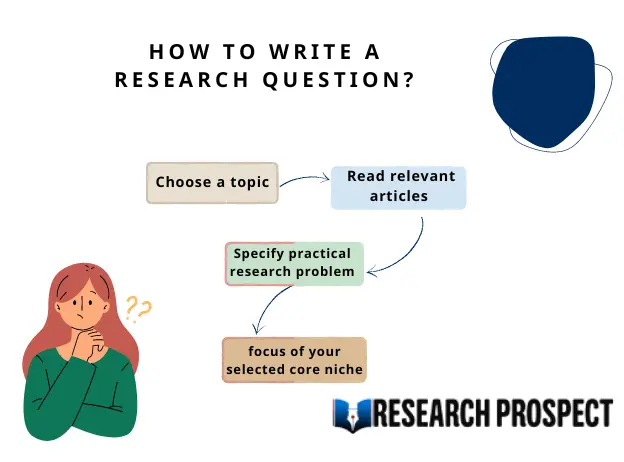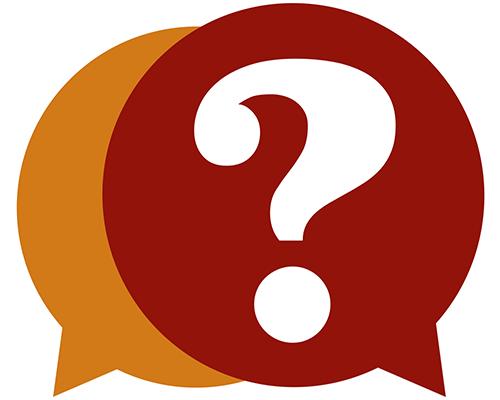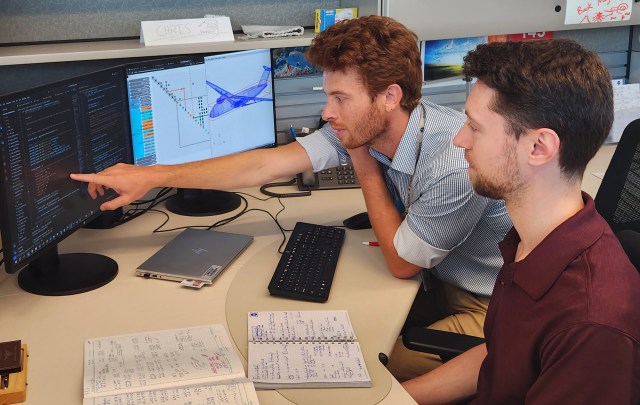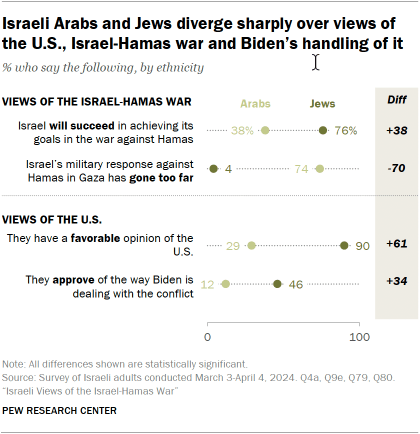- Privacy Policy

Home » Research Questions – Types, Examples and Writing Guide

Research Questions – Types, Examples and Writing Guide
Table of Contents

Research Questions
Definition:
Research questions are the specific questions that guide a research study or inquiry. These questions help to define the scope of the research and provide a clear focus for the study. Research questions are usually developed at the beginning of a research project and are designed to address a particular research problem or objective.
Types of Research Questions
Types of Research Questions are as follows:
Descriptive Research Questions
These aim to describe a particular phenomenon, group, or situation. For example:
- What are the characteristics of the target population?
- What is the prevalence of a particular disease in a specific region?
Exploratory Research Questions
These aim to explore a new area of research or generate new ideas or hypotheses. For example:
- What are the potential causes of a particular phenomenon?
- What are the possible outcomes of a specific intervention?
Explanatory Research Questions
These aim to understand the relationship between two or more variables or to explain why a particular phenomenon occurs. For example:
- What is the effect of a specific drug on the symptoms of a particular disease?
- What are the factors that contribute to employee turnover in a particular industry?
Predictive Research Questions
These aim to predict a future outcome or trend based on existing data or trends. For example :
- What will be the future demand for a particular product or service?
- What will be the future prevalence of a particular disease?
Evaluative Research Questions
These aim to evaluate the effectiveness of a particular intervention or program. For example:
- What is the impact of a specific educational program on student learning outcomes?
- What is the effectiveness of a particular policy or program in achieving its intended goals?
How to Choose Research Questions
Choosing research questions is an essential part of the research process and involves careful consideration of the research problem, objectives, and design. Here are some steps to consider when choosing research questions:
- Identify the research problem: Start by identifying the problem or issue that you want to study. This could be a gap in the literature, a social or economic issue, or a practical problem that needs to be addressed.
- Conduct a literature review: Conducting a literature review can help you identify existing research in your area of interest and can help you formulate research questions that address gaps or limitations in the existing literature.
- Define the research objectives : Clearly define the objectives of your research. What do you want to achieve with your study? What specific questions do you want to answer?
- Consider the research design : Consider the research design that you plan to use. This will help you determine the appropriate types of research questions to ask. For example, if you plan to use a qualitative approach, you may want to focus on exploratory or descriptive research questions.
- Ensure that the research questions are clear and answerable: Your research questions should be clear and specific, and should be answerable with the data that you plan to collect. Avoid asking questions that are too broad or vague.
- Get feedback : Get feedback from your supervisor, colleagues, or peers to ensure that your research questions are relevant, feasible, and meaningful.
How to Write Research Questions
Guide for Writing Research Questions:
- Start with a clear statement of the research problem: Begin by stating the problem or issue that your research aims to address. This will help you to formulate focused research questions.
- Use clear language : Write your research questions in clear and concise language that is easy to understand. Avoid using jargon or technical terms that may be unfamiliar to your readers.
- Be specific: Your research questions should be specific and focused. Avoid broad questions that are difficult to answer. For example, instead of asking “What is the impact of climate change on the environment?” ask “What are the effects of rising sea levels on coastal ecosystems?”
- Use appropriate question types: Choose the appropriate question types based on the research design and objectives. For example, if you are conducting a qualitative study, you may want to use open-ended questions that allow participants to provide detailed responses.
- Consider the feasibility of your questions : Ensure that your research questions are feasible and can be answered with the resources available. Consider the data sources and methods of data collection when writing your questions.
- Seek feedback: Get feedback from your supervisor, colleagues, or peers to ensure that your research questions are relevant, appropriate, and meaningful.
Examples of Research Questions
Some Examples of Research Questions with Research Titles:
Research Title: The Impact of Social Media on Mental Health
- Research Question : What is the relationship between social media use and mental health, and how does this impact individuals’ well-being?
Research Title: Factors Influencing Academic Success in High School
- Research Question: What are the primary factors that influence academic success in high school, and how do they contribute to student achievement?
Research Title: The Effects of Exercise on Physical and Mental Health
- Research Question: What is the relationship between exercise and physical and mental health, and how can exercise be used as a tool to improve overall well-being?
Research Title: Understanding the Factors that Influence Consumer Purchasing Decisions
- Research Question : What are the key factors that influence consumer purchasing decisions, and how do these factors vary across different demographics and products?
Research Title: The Impact of Technology on Communication
- Research Question : How has technology impacted communication patterns, and what are the effects of these changes on interpersonal relationships and society as a whole?
Research Title: Investigating the Relationship between Parenting Styles and Child Development
- Research Question: What is the relationship between different parenting styles and child development outcomes, and how do these outcomes vary across different ages and developmental stages?
Research Title: The Effectiveness of Cognitive-Behavioral Therapy in Treating Anxiety Disorders
- Research Question: How effective is cognitive-behavioral therapy in treating anxiety disorders, and what factors contribute to its success or failure in different patients?
Research Title: The Impact of Climate Change on Biodiversity
- Research Question : How is climate change affecting global biodiversity, and what can be done to mitigate the negative effects on natural ecosystems?
Research Title: Exploring the Relationship between Cultural Diversity and Workplace Productivity
- Research Question : How does cultural diversity impact workplace productivity, and what strategies can be employed to maximize the benefits of a diverse workforce?
Research Title: The Role of Artificial Intelligence in Healthcare
- Research Question: How can artificial intelligence be leveraged to improve healthcare outcomes, and what are the potential risks and ethical concerns associated with its use?
Applications of Research Questions
Here are some of the key applications of research questions:
- Defining the scope of the study : Research questions help researchers to narrow down the scope of their study and identify the specific issues they want to investigate.
- Developing hypotheses: Research questions often lead to the development of hypotheses, which are testable predictions about the relationship between variables. Hypotheses provide a clear and focused direction for the study.
- Designing the study : Research questions guide the design of the study, including the selection of participants, the collection of data, and the analysis of results.
- Collecting data : Research questions inform the selection of appropriate methods for collecting data, such as surveys, interviews, or experiments.
- Analyzing data : Research questions guide the analysis of data, including the selection of appropriate statistical tests and the interpretation of results.
- Communicating results : Research questions help researchers to communicate the results of their study in a clear and concise manner. The research questions provide a framework for discussing the findings and drawing conclusions.
Characteristics of Research Questions
Characteristics of Research Questions are as follows:
- Clear and Specific : A good research question should be clear and specific. It should clearly state what the research is trying to investigate and what kind of data is required.
- Relevant : The research question should be relevant to the study and should address a current issue or problem in the field of research.
- Testable : The research question should be testable through empirical evidence. It should be possible to collect data to answer the research question.
- Concise : The research question should be concise and focused. It should not be too broad or too narrow.
- Feasible : The research question should be feasible to answer within the constraints of the research design, time frame, and available resources.
- Original : The research question should be original and should contribute to the existing knowledge in the field of research.
- Significant : The research question should have significance and importance to the field of research. It should have the potential to provide new insights and knowledge to the field.
- Ethical : The research question should be ethical and should not cause harm to any individuals or groups involved in the study.
Purpose of Research Questions
Research questions are the foundation of any research study as they guide the research process and provide a clear direction to the researcher. The purpose of research questions is to identify the scope and boundaries of the study, and to establish the goals and objectives of the research.
The main purpose of research questions is to help the researcher to focus on the specific area or problem that needs to be investigated. They enable the researcher to develop a research design, select the appropriate methods and tools for data collection and analysis, and to organize the results in a meaningful way.
Research questions also help to establish the relevance and significance of the study. They define the research problem, and determine the research methodology that will be used to address the problem. Research questions also help to determine the type of data that will be collected, and how it will be analyzed and interpreted.
Finally, research questions provide a framework for evaluating the results of the research. They help to establish the validity and reliability of the data, and provide a basis for drawing conclusions and making recommendations based on the findings of the study.
Advantages of Research Questions
There are several advantages of research questions in the research process, including:
- Focus : Research questions help to focus the research by providing a clear direction for the study. They define the specific area of investigation and provide a framework for the research design.
- Clarity : Research questions help to clarify the purpose and objectives of the study, which can make it easier for the researcher to communicate the research aims to others.
- Relevance : Research questions help to ensure that the study is relevant and meaningful. By asking relevant and important questions, the researcher can ensure that the study will contribute to the existing body of knowledge and address important issues.
- Consistency : Research questions help to ensure consistency in the research process by providing a framework for the development of the research design, data collection, and analysis.
- Measurability : Research questions help to ensure that the study is measurable by defining the specific variables and outcomes that will be measured.
- Replication : Research questions help to ensure that the study can be replicated by providing a clear and detailed description of the research aims, methods, and outcomes. This makes it easier for other researchers to replicate the study and verify the results.
Limitations of Research Questions
Limitations of Research Questions are as follows:
- Subjectivity : Research questions are often subjective and can be influenced by personal biases and perspectives of the researcher. This can lead to a limited understanding of the research problem and may affect the validity and reliability of the study.
- Inadequate scope : Research questions that are too narrow in scope may limit the breadth of the study, while questions that are too broad may make it difficult to focus on specific research objectives.
- Unanswerable questions : Some research questions may not be answerable due to the lack of available data or limitations in research methods. In such cases, the research question may need to be rephrased or modified to make it more answerable.
- Lack of clarity : Research questions that are poorly worded or ambiguous can lead to confusion and misinterpretation. This can result in incomplete or inaccurate data, which may compromise the validity of the study.
- Difficulty in measuring variables : Some research questions may involve variables that are difficult to measure or quantify, making it challenging to draw meaningful conclusions from the data.
- Lack of generalizability: Research questions that are too specific or limited in scope may not be generalizable to other contexts or populations. This can limit the applicability of the study’s findings and restrict its broader implications.
About the author
Muhammad Hassan
Researcher, Academic Writer, Web developer
You may also like

Data Collection – Methods Types and Examples

Delimitations in Research – Types, Examples and...

Research Process – Steps, Examples and Tips

Research Design – Types, Methods and Examples

Institutional Review Board – Application Sample...

Evaluating Research – Process, Examples and...

Get science-backed answers as you write with Paperpal's Research feature
How to Write a Research Question: Types and Examples

The first step in any research project is framing the research question. It can be considered the core of any systematic investigation as the research outcomes are tied to asking the right questions. Thus, this primary interrogation point sets the pace for your research as it helps collect relevant and insightful information that ultimately influences your work.
Typically, the research question guides the stages of inquiry, analysis, and reporting. Depending on the use of quantifiable or quantitative data, research questions are broadly categorized into quantitative or qualitative research questions. Both types of research questions can be used independently or together, considering the overall focus and objectives of your research.
What is a research question?
A research question is a clear, focused, concise, and arguable question on which your research and writing are centered. 1 It states various aspects of the study, including the population and variables to be studied and the problem the study addresses. These questions also set the boundaries of the study, ensuring cohesion.
Designing the research question is a dynamic process where the researcher can change or refine the research question as they review related literature and develop a framework for the study. Depending on the scale of your research, the study can include single or multiple research questions.
A good research question has the following features:
- It is relevant to the chosen field of study.
- The question posed is arguable and open for debate, requiring synthesizing and analysis of ideas.
- It is focused and concisely framed.
- A feasible solution is possible within the given practical constraint and timeframe.
A poorly formulated research question poses several risks. 1
- Researchers can adopt an erroneous design.
- It can create confusion and hinder the thought process, including developing a clear protocol.
- It can jeopardize publication efforts.
- It causes difficulty in determining the relevance of the study findings.
- It causes difficulty in whether the study fulfils the inclusion criteria for systematic review and meta-analysis. This creates challenges in determining whether additional studies or data collection is needed to answer the question.
- Readers may fail to understand the objective of the study. This reduces the likelihood of the study being cited by others.
Now that you know “What is a research question?”, let’s look at the different types of research questions.
Types of research questions
Depending on the type of research to be done, research questions can be classified broadly into quantitative, qualitative, or mixed-methods studies. Knowing the type of research helps determine the best type of research question that reflects the direction and epistemological underpinnings of your research.
The structure and wording of quantitative 2 and qualitative research 3 questions differ significantly. The quantitative study looks at causal relationships, whereas the qualitative study aims at exploring a phenomenon.
- Quantitative research questions:
- Seeks to investigate social, familial, or educational experiences or processes in a particular context and/or location.
- Answers ‘how,’ ‘what,’ or ‘why’ questions.
- Investigates connections, relations, or comparisons between independent and dependent variables.
Quantitative research questions can be further categorized into descriptive, comparative, and relationship, as explained in the Table below.
- Qualitative research questions
Qualitative research questions are adaptable, non-directional, and more flexible. It concerns broad areas of research or more specific areas of study to discover, explain, or explore a phenomenon. These are further classified as follows:
- Mixed-methods studies
Mixed-methods studies use both quantitative and qualitative research questions to answer your research question. Mixed methods provide a complete picture than standalone quantitative or qualitative research, as it integrates the benefits of both methods. Mixed methods research is often used in multidisciplinary settings and complex situational or societal research, especially in the behavioral, health, and social science fields.
What makes a good research question
A good research question should be clear and focused to guide your research. It should synthesize multiple sources to present your unique argument, and should ideally be something that you are interested in. But avoid questions that can be answered in a few factual statements. The following are the main attributes of a good research question.
- Specific: The research question should not be a fishing expedition performed in the hopes that some new information will be found that will benefit the researcher. The central research question should work with your research problem to keep your work focused. If using multiple questions, they should all tie back to the central aim.
- Measurable: The research question must be answerable using quantitative and/or qualitative data or from scholarly sources to develop your research question. If such data is impossible to access, it is better to rethink your question.
- Attainable: Ensure you have enough time and resources to do all research required to answer your question. If it seems you will not be able to gain access to the data you need, consider narrowing down your question to be more specific.
- You have the expertise
- You have the equipment and resources
- Realistic: Developing your research question should be based on initial reading about your topic. It should focus on addressing a problem or gap in the existing knowledge in your field or discipline.
- Based on some sort of rational physics
- Can be done in a reasonable time frame
- Timely: The research question should contribute to an existing and current debate in your field or in society at large. It should produce knowledge that future researchers or practitioners can later build on.
- Novel
- Based on current technologies.
- Important to answer current problems or concerns.
- Lead to new directions.
- Important: Your question should have some aspect of originality. Incremental research is as important as exploring disruptive technologies. For example, you can focus on a specific location or explore a new angle.
- Meaningful whether the answer is “Yes” or “No.” Closed-ended, yes/no questions are too simple to work as good research questions. Such questions do not provide enough scope for robust investigation and discussion. A good research question requires original data, synthesis of multiple sources, and original interpretation and argumentation before providing an answer.
Steps for developing a good research question
The importance of research questions cannot be understated. When drafting a research question, use the following frameworks to guide the components of your question to ease the process. 4
- Determine the requirements: Before constructing a good research question, set your research requirements. What is the purpose? Is it descriptive, comparative, or explorative research? Determining the research aim will help you choose the most appropriate topic and word your question appropriately.
- Select a broad research topic: Identify a broader subject area of interest that requires investigation. Techniques such as brainstorming or concept mapping can help identify relevant connections and themes within a broad research topic. For example, how to learn and help students learn.
- Perform preliminary investigation: Preliminary research is needed to obtain up-to-date and relevant knowledge on your topic. It also helps identify issues currently being discussed from which information gaps can be identified.
- Narrow your focus: Narrow the scope and focus of your research to a specific niche. This involves focusing on gaps in existing knowledge or recent literature or extending or complementing the findings of existing literature. Another approach involves constructing strong research questions that challenge your views or knowledge of the area of study (Example: Is learning consistent with the existing learning theory and research).
- Identify the research problem: Once the research question has been framed, one should evaluate it. This is to realize the importance of the research questions and if there is a need for more revising (Example: How do your beliefs on learning theory and research impact your instructional practices).
How to write a research question
Those struggling to understand how to write a research question, these simple steps can help you simplify the process of writing a research question.
Sample Research Questions
The following are some bad and good research question examples
- Example 1
- Example 2
References:
- Thabane, L., Thomas, T., Ye, C., & Paul, J. (2009). Posing the research question: not so simple. Canadian Journal of Anesthesia/Journal canadien d’anesthésie , 56 (1), 71-79.
- Rutberg, S., & Bouikidis, C. D. (2018). Focusing on the fundamentals: A simplistic differentiation between qualitative and quantitative research. Nephrology Nursing Journal , 45 (2), 209-213.
- Kyngäs, H. (2020). Qualitative research and content analysis. The application of content analysis in nursing science research , 3-11.
- Mattick, K., Johnston, J., & de la Croix, A. (2018). How to… write a good research question. The clinical teacher , 15 (2), 104-108.
- Fandino, W. (2019). Formulating a good research question: Pearls and pitfalls. Indian Journal of Anaesthesia , 63 (8), 611.
- Richardson, W. S., Wilson, M. C., Nishikawa, J., & Hayward, R. S. (1995). The well-built clinical question: a key to evidence-based decisions. ACP journal club , 123 (3), A12-A13
Paperpal is a comprehensive AI writing toolkit that helps students and researchers achieve 2x the writing in half the time. It leverages 21+ years of STM experience and insights from millions of research articles to provide in-depth academic writing, language editing, and submission readiness support to help you write better, faster.
Get accurate academic translations, rewriting support, grammar checks, vocabulary suggestions, and generative AI assistance that delivers human precision at machine speed. Try for free or upgrade to Paperpal Prime starting at US$19 a month to access premium features, including consistency, plagiarism, and 30+ submission readiness checks to help you succeed.
Experience the future of academic writing – Sign up to Paperpal and start writing for free!
Related Reads:
- Scientific Writing Style Guides Explained
- Ethical Research Practices For Research with Human Subjects
- 8 Most Effective Ways to Increase Motivation for Thesis Writing
- 6 Tips for Post-Doc Researchers to Take Their Career to the Next Level
Transitive and Intransitive Verbs in the World of Research
Language and grammar rules for academic writing, you may also like, mla works cited page: format, template & examples, academic editing: how to self-edit academic text with..., measuring academic success: definition & strategies for excellence, phd qualifying exam: tips for success , quillbot review: features, pricing, and free alternatives, what is an academic paper types and elements , 9 steps to publish a research paper, what are the different types of research papers, how to make translating academic papers less challenging, 6 tips for post-doc researchers to take their....
Research Aims, Objectives & Questions
The “Golden Thread” Explained Simply (+ Examples)
By: David Phair (PhD) and Alexandra Shaeffer (PhD) | June 2022
The research aims , objectives and research questions (collectively called the “golden thread”) are arguably the most important thing you need to get right when you’re crafting a research proposal , dissertation or thesis . We receive questions almost every day about this “holy trinity” of research and there’s certainly a lot of confusion out there, so we’ve crafted this post to help you navigate your way through the fog.
Overview: The Golden Thread
- What is the golden thread
- What are research aims ( examples )
- What are research objectives ( examples )
- What are research questions ( examples )
- The importance of alignment in the golden thread
What is the “golden thread”?
The golden thread simply refers to the collective research aims , research objectives , and research questions for any given project (i.e., a dissertation, thesis, or research paper ). These three elements are bundled together because it’s extremely important that they align with each other, and that the entire research project aligns with them.
Importantly, the golden thread needs to weave its way through the entirety of any research project , from start to end. In other words, it needs to be very clearly defined right at the beginning of the project (the topic ideation and proposal stage) and it needs to inform almost every decision throughout the rest of the project. For example, your research design and methodology will be heavily influenced by the golden thread (we’ll explain this in more detail later), as well as your literature review.
The research aims, objectives and research questions (the golden thread) define the focus and scope ( the delimitations ) of your research project. In other words, they help ringfence your dissertation or thesis to a relatively narrow domain, so that you can “go deep” and really dig into a specific problem or opportunity. They also help keep you on track , as they act as a litmus test for relevance. In other words, if you’re ever unsure whether to include something in your document, simply ask yourself the question, “does this contribute toward my research aims, objectives or questions?”. If it doesn’t, chances are you can drop it.
Alright, enough of the fluffy, conceptual stuff. Let’s get down to business and look at what exactly the research aims, objectives and questions are and outline a few examples to bring these concepts to life.

Research Aims: What are they?
Simply put, the research aim(s) is a statement that reflects the broad overarching goal (s) of the research project. Research aims are fairly high-level (low resolution) as they outline the general direction of the research and what it’s trying to achieve .
Research Aims: Examples
True to the name, research aims usually start with the wording “this research aims to…”, “this research seeks to…”, and so on. For example:
“This research aims to explore employee experiences of digital transformation in retail HR.” “This study sets out to assess the interaction between student support and self-care on well-being in engineering graduate students”
As you can see, these research aims provide a high-level description of what the study is about and what it seeks to achieve. They’re not hyper-specific or action-oriented, but they’re clear about what the study’s focus is and what is being investigated.
Need a helping hand?
Research Objectives: What are they?
The research objectives take the research aims and make them more practical and actionable . In other words, the research objectives showcase the steps that the researcher will take to achieve the research aims.
The research objectives need to be far more specific (higher resolution) and actionable than the research aims. In fact, it’s always a good idea to craft your research objectives using the “SMART” criteria. In other words, they should be specific, measurable, achievable, relevant and time-bound”.
Research Objectives: Examples
Let’s look at two examples of research objectives. We’ll stick with the topic and research aims we mentioned previously.
For the digital transformation topic:
To observe the retail HR employees throughout the digital transformation. To assess employee perceptions of digital transformation in retail HR. To identify the barriers and facilitators of digital transformation in retail HR.
And for the student wellness topic:
To determine whether student self-care predicts the well-being score of engineering graduate students. To determine whether student support predicts the well-being score of engineering students. To assess the interaction between student self-care and student support when predicting well-being in engineering graduate students.
As you can see, these research objectives clearly align with the previously mentioned research aims and effectively translate the low-resolution aims into (comparatively) higher-resolution objectives and action points . They give the research project a clear focus and present something that resembles a research-based “to-do” list.

Research Questions: What are they?
Finally, we arrive at the all-important research questions. The research questions are, as the name suggests, the key questions that your study will seek to answer . Simply put, they are the core purpose of your dissertation, thesis, or research project. You’ll present them at the beginning of your document (either in the introduction chapter or literature review chapter) and you’ll answer them at the end of your document (typically in the discussion and conclusion chapters).
The research questions will be the driving force throughout the research process. For example, in the literature review chapter, you’ll assess the relevance of any given resource based on whether it helps you move towards answering your research questions. Similarly, your methodology and research design will be heavily influenced by the nature of your research questions. For instance, research questions that are exploratory in nature will usually make use of a qualitative approach, whereas questions that relate to measurement or relationship testing will make use of a quantitative approach.
Let’s look at some examples of research questions to make this more tangible.
Research Questions: Examples
Again, we’ll stick with the research aims and research objectives we mentioned previously.
For the digital transformation topic (which would be qualitative in nature):
How do employees perceive digital transformation in retail HR? What are the barriers and facilitators of digital transformation in retail HR?
And for the student wellness topic (which would be quantitative in nature):
Does student self-care predict the well-being scores of engineering graduate students? Does student support predict the well-being scores of engineering students? Do student self-care and student support interact when predicting well-being in engineering graduate students?
You’ll probably notice that there’s quite a formulaic approach to this. In other words, the research questions are basically the research objectives “converted” into question format. While that is true most of the time, it’s not always the case. For example, the first research objective for the digital transformation topic was more or less a step on the path toward the other objectives, and as such, it didn’t warrant its own research question.
So, don’t rush your research questions and sloppily reword your objectives as questions. Carefully think about what exactly you’re trying to achieve (i.e. your research aim) and the objectives you’ve set out, then craft a set of well-aligned research questions . Also, keep in mind that this can be a somewhat iterative process , where you go back and tweak research objectives and aims to ensure tight alignment throughout the golden thread.
The importance of strong alignment
Alignment is the keyword here and we have to stress its importance . Simply put, you need to make sure that there is a very tight alignment between all three pieces of the golden thread. If your research aims and research questions don’t align, for example, your project will be pulling in different directions and will lack focus . This is a common problem students face and can cause many headaches (and tears), so be warned.
Take the time to carefully craft your research aims, objectives and research questions before you run off down the research path. Ideally, get your research supervisor/advisor to review and comment on your golden thread before you invest significant time into your project, and certainly before you start collecting data .
Recap: The golden thread
In this post, we unpacked the golden thread of research, consisting of the research aims , research objectives and research questions . You can jump back to any section using the links below.
As always, feel free to leave a comment below – we always love to hear from you. Also, if you’re interested in 1-on-1 support, take a look at our private coaching service here.

Psst... there’s more!
This post was based on one of our popular Research Bootcamps . If you're working on a research project, you'll definitely want to check this out ...
You Might Also Like:

39 Comments
Thank you very much for your great effort put. As an Undergraduate taking Demographic Research & Methodology, I’ve been trying so hard to understand clearly what is a Research Question, Research Aim and the Objectives in a research and the relationship between them etc. But as for now I’m thankful that you’ve solved my problem.
Well appreciated. This has helped me greatly in doing my dissertation.
An so delighted with this wonderful information thank you a lot.
so impressive i have benefited a lot looking forward to learn more on research.
I am very happy to have carefully gone through this well researched article.
Infact,I used to be phobia about anything research, because of my poor understanding of the concepts.
Now,I get to know that my research question is the same as my research objective(s) rephrased in question format.
I please I would need a follow up on the subject,as I intends to join the team of researchers. Thanks once again.
Thanks so much. This was really helpful.
I know you pepole have tried to break things into more understandable and easy format. And God bless you. Keep it up
i found this document so useful towards my study in research methods. thanks so much.
This is my 2nd read topic in your course and I should commend the simplified explanations of each part. I’m beginning to understand and absorb the use of each part of a dissertation/thesis. I’ll keep on reading your free course and might be able to avail the training course! Kudos!
Thank you! Better put that my lecture and helped to easily understand the basics which I feel often get brushed over when beginning dissertation work.
This is quite helpful. I like how the Golden thread has been explained and the needed alignment.
This is quite helpful. I really appreciate!
The article made it simple for researcher students to differentiate between three concepts.
Very innovative and educational in approach to conducting research.
I am very impressed with all these terminology, as I am a fresh student for post graduate, I am highly guided and I promised to continue making consultation when the need arise. Thanks a lot.
A very helpful piece. thanks, I really appreciate it .
Very well explained, and it might be helpful to many people like me.
Wish i had found this (and other) resource(s) at the beginning of my PhD journey… not in my writing up year… 😩 Anyways… just a quick question as i’m having some issues ordering my “golden thread”…. does it matter in what order you mention them? i.e., is it always first aims, then objectives, and finally the questions? or can you first mention the research questions and then the aims and objectives?
Thank you for a very simple explanation that builds upon the concepts in a very logical manner. Just prior to this, I read the research hypothesis article, which was equally very good. This met my primary objective.
My secondary objective was to understand the difference between research questions and research hypothesis, and in which context to use which one. However, I am still not clear on this. Can you kindly please guide?
In research, a research question is a clear and specific inquiry that the researcher wants to answer, while a research hypothesis is a tentative statement or prediction about the relationship between variables or the expected outcome of the study. Research questions are broader and guide the overall study, while hypotheses are specific and testable statements used in quantitative research. Research questions identify the problem, while hypotheses provide a focus for testing in the study.
Exactly what I need in this research journey, I look forward to more of your coaching videos.
This helped a lot. Thanks so much for the effort put into explaining it.
What data source in writing dissertation/Thesis requires?
What is data source covers when writing dessertation/thesis
This is quite useful thanks
I’m excited and thankful. I got so much value which will help me progress in my thesis.
where are the locations of the reserch statement, research objective and research question in a reserach paper? Can you write an ouline that defines their places in the researh paper?
Very helpful and important tips on Aims, Objectives and Questions.
Thank you so much for making research aim, research objectives and research question so clear. This will be helpful to me as i continue with my thesis.
Thanks much for this content. I learned a lot. And I am inspired to learn more. I am still struggling with my preparation for dissertation outline/proposal. But I consistently follow contents and tutorials and the new FB of GRAD Coach. Hope to really become confident in writing my dissertation and successfully defend it.
As a researcher and lecturer, I find splitting research goals into research aims, objectives, and questions is unnecessarily bureaucratic and confusing for students. For most biomedical research projects, including ‘real research’, 1-3 research questions will suffice (numbers may differ by discipline).
Awesome! Very important resources and presented in an informative way to easily understand the golden thread. Indeed, thank you so much.
Well explained
The blog article on research aims, objectives, and questions by Grad Coach is a clear and insightful guide that aligns with my experiences in academic research. The article effectively breaks down the often complex concepts of research aims and objectives, providing a straightforward and accessible explanation. Drawing from my own research endeavors, I appreciate the practical tips offered, such as the need for specificity and clarity when formulating research questions. The article serves as a valuable resource for students and researchers, offering a concise roadmap for crafting well-defined research goals and objectives. Whether you’re a novice or an experienced researcher, this article provides practical insights that contribute to the foundational aspects of a successful research endeavor.
A great thanks for you. it is really amazing explanation. I grasp a lot and one step up to research knowledge.
I really found these tips helpful. Thank you very much Grad Coach.
I found this article helpful. Thanks for sharing this.
thank you so much, the explanation and examples are really helpful
Submit a Comment Cancel reply
Your email address will not be published. Required fields are marked *
Save my name, email, and website in this browser for the next time I comment.
- Print Friendly
- Affiliate Program

- UNITED STATES
- 台灣 (TAIWAN)
- TÜRKIYE (TURKEY)
- Academic Editing Services
- - Research Paper
- - Journal Manuscript
- - Dissertation
- - College & University Assignments
- Admissions Editing Services
- - Application Essay
- - Personal Statement
- - Recommendation Letter
- - Cover Letter
- - CV/Resume
- Business Editing Services
- - Business Documents
- - Report & Brochure
- - Website & Blog
- Writer Editing Services
- - Script & Screenplay
- Our Editors
- Client Reviews
- Editing & Proofreading Prices
- Wordvice Points
- Partner Discount
- Plagiarism Checker
- APA Citation Generator
- MLA Citation Generator
- Chicago Citation Generator
- Vancouver Citation Generator
- - APA Style
- - MLA Style
- - Chicago Style
- - Vancouver Style
- Writing & Editing Guide
- Academic Resources
- Admissions Resources
How to Write a Good Research Question (w/ Examples)
What is a Research Question?
A research question is the main question that your study sought or is seeking to answer. A clear research question guides your research paper or thesis and states exactly what you want to find out, giving your work a focus and objective. Learning how to write a hypothesis or research question is the start to composing any thesis, dissertation, or research paper. It is also one of the most important sections of a research proposal .
A good research question not only clarifies the writing in your study; it provides your readers with a clear focus and facilitates their understanding of your research topic, as well as outlining your study’s objectives. Before drafting the paper and receiving research paper editing (and usually before performing your study), you should write a concise statement of what this study intends to accomplish or reveal.
Research Question Writing Tips
Listed below are the important characteristics of a good research question:
A good research question should:
- Be clear and provide specific information so readers can easily understand the purpose.
- Be focused in its scope and narrow enough to be addressed in the space allowed by your paper
- Be relevant and concise and express your main ideas in as few words as possible, like a hypothesis.
- Be precise and complex enough that it does not simply answer a closed “yes or no” question, but requires an analysis of arguments and literature prior to its being considered acceptable.
- Be arguable or testable so that answers to the research question are open to scrutiny and specific questions and counterarguments.
Some of these characteristics might be difficult to understand in the form of a list. Let’s go into more detail about what a research question must do and look at some examples of research questions.
The research question should be specific and focused
Research questions that are too broad are not suitable to be addressed in a single study. One reason for this can be if there are many factors or variables to consider. In addition, a sample data set that is too large or an experimental timeline that is too long may suggest that the research question is not focused enough.
A specific research question means that the collective data and observations come together to either confirm or deny the chosen hypothesis in a clear manner. If a research question is too vague, then the data might end up creating an alternate research problem or hypothesis that you haven’t addressed in your Introduction section .
The research question should be based on the literature
An effective research question should be answerable and verifiable based on prior research because an effective scientific study must be placed in the context of a wider academic consensus. This means that conspiracy or fringe theories are not good research paper topics.
Instead, a good research question must extend, examine, and verify the context of your research field. It should fit naturally within the literature and be searchable by other research authors.
References to the literature can be in different citation styles and must be properly formatted according to the guidelines set forth by the publishing journal, university, or academic institution. This includes in-text citations as well as the Reference section .
The research question should be realistic in time, scope, and budget
There are two main constraints to the research process: timeframe and budget.
A proper research question will include study or experimental procedures that can be executed within a feasible time frame, typically by a graduate doctoral or master’s student or lab technician. Research that requires future technology, expensive resources, or follow-up procedures is problematic.
A researcher’s budget is also a major constraint to performing timely research. Research at many large universities or institutions is publicly funded and is thus accountable to funding restrictions.
The research question should be in-depth
Research papers, dissertations and theses , and academic journal articles are usually dozens if not hundreds of pages in length.
A good research question or thesis statement must be sufficiently complex to warrant such a length, as it must stand up to the scrutiny of peer review and be reproducible by other scientists and researchers.
Research Question Types
Qualitative and quantitative research are the two major types of research, and it is essential to develop research questions for each type of study.
Quantitative Research Questions
Quantitative research questions are specific. A typical research question involves the population to be studied, dependent and independent variables, and the research design.
In addition, quantitative research questions connect the research question and the research design. In addition, it is not possible to answer these questions definitively with a “yes” or “no” response. For example, scientific fields such as biology, physics, and chemistry often deal with “states,” in which different quantities, amounts, or velocities drastically alter the relevance of the research.
As a consequence, quantitative research questions do not contain qualitative, categorical, or ordinal qualifiers such as “is,” “are,” “does,” or “does not.”
Categories of quantitative research questions
Qualitative research questions.
In quantitative research, research questions have the potential to relate to broad research areas as well as more specific areas of study. Qualitative research questions are less directional, more flexible, and adaptable compared with their quantitative counterparts. Thus, studies based on these questions tend to focus on “discovering,” “explaining,” “elucidating,” and “exploring.”
Categories of qualitative research questions
Quantitative and qualitative research question examples.

Good and Bad Research Question Examples
Below are some good (and not-so-good) examples of research questions that researchers can use to guide them in crafting their own research questions.
Research Question Example 1
The first research question is too vague in both its independent and dependent variables. There is no specific information on what “exposure” means. Does this refer to comments, likes, engagement, or just how much time is spent on the social media platform?
Second, there is no useful information on what exactly “affected” means. Does the subject’s behavior change in some measurable way? Or does this term refer to another factor such as the user’s emotions?
Research Question Example 2
In this research question, the first example is too simple and not sufficiently complex, making it difficult to assess whether the study answered the question. The author could really only answer this question with a simple “yes” or “no.” Further, the presence of data would not help answer this question more deeply, which is a sure sign of a poorly constructed research topic.
The second research question is specific, complex, and empirically verifiable. One can measure program effectiveness based on metrics such as attendance or grades. Further, “bullying” is made into an empirical, quantitative measurement in the form of recorded disciplinary actions.
Steps for Writing a Research Question
Good research questions are relevant, focused, and meaningful. It can be difficult to come up with a good research question, but there are a few steps you can follow to make it a bit easier.
1. Start with an interesting and relevant topic
Choose a research topic that is interesting but also relevant and aligned with your own country’s culture or your university’s capabilities. Popular academic topics include healthcare and medical-related research. However, if you are attending an engineering school or humanities program, you should obviously choose a research question that pertains to your specific study and major.
Below is an embedded graph of the most popular research fields of study based on publication output according to region. As you can see, healthcare and the basic sciences receive the most funding and earn the highest number of publications.

2. Do preliminary research
You can begin doing preliminary research once you have chosen a research topic. Two objectives should be accomplished during this first phase of research. First, you should undertake a preliminary review of related literature to discover issues that scholars and peers are currently discussing. With this method, you show that you are informed about the latest developments in the field.
Secondly, identify knowledge gaps or limitations in your topic by conducting a preliminary literature review . It is possible to later use these gaps to focus your research question after a certain amount of fine-tuning.
3. Narrow your research to determine specific research questions
You can focus on a more specific area of study once you have a good handle on the topic you want to explore. Focusing on recent literature or knowledge gaps is one good option.
By identifying study limitations in the literature and overlooked areas of study, an author can carve out a good research question. The same is true for choosing research questions that extend or complement existing literature.
4. Evaluate your research question
Make sure you evaluate the research question by asking the following questions:
Is my research question clear?
The resulting data and observations that your study produces should be clear. For quantitative studies, data must be empirical and measurable. For qualitative, the observations should be clearly delineable across categories.
Is my research question focused and specific?
A strong research question should be specific enough that your methodology or testing procedure produces an objective result, not one left to subjective interpretation. Open-ended research questions or those relating to general topics can create ambiguous connections between the results and the aims of the study.
Is my research question sufficiently complex?
The result of your research should be consequential and substantial (and fall sufficiently within the context of your field) to warrant an academic study. Simply reinforcing or supporting a scientific consensus is superfluous and will likely not be well received by most journal editors.

Editing Your Research Question
Your research question should be fully formulated well before you begin drafting your research paper. However, you can receive English paper editing and proofreading services at any point in the drafting process. Language editors with expertise in your academic field can assist you with the content and language in your Introduction section or other manuscript sections. And if you need further assistance or information regarding paper compositions, in the meantime, check out our academic resources , which provide dozens of articles and videos on a variety of academic writing and publication topics.
Literature Reviews
- Getting Started
- Choosing a Type of Review
Developing a Research Question
Finding example literature reviews.
- Searching the Literature
- Searching Tips
- ChatGPT [beta]
- Documenting your Search
- Using Citation Managers
- Concept Mapping
- Writing the Review
- Further Resources
Goldilocker Tool

UM Librarians have developed a quick tool called Goldilocker to help beginners who are struggling to refine their Research Question.
DEVELOPING A RESEARCH QUESTION
Before searching for sources, you need to formulate a Research Question — this is what you are trying to answer using the existing academic literature. The Research Question pinpoints the focus of the review .
Your first step involves choosing, exploring, and focusing a topic. At this stage you might discover that you need to tweak your topic or the scope of your research as you learn more about the topic in the literature.
THINGS TO KEEP IN MIND:
- The question must be "researchable" — it can be answered with accessible facts and data
- Questions often start with How, Why, What, Which
- The question opens the door for other areas of inquiry — it identifies a gap in existing research
- Questions should be open-ended and focus on cause and effect
TRY TO AVOID:
- Simple yes/no questions, or questions with an easy answer (what is the radius of the moon?)
- Questions that can only be answered by an opinion (does it smell nice when it rains?)
- Questions that involve secret information (what is the recipe for Coca-Cola?)
- Questions that are too broad or too narrow
REFINING YOUR RESEARCH QUESTION
Two examples of refining research questions that could be considered either too broad or too narrow.
USING DATABASE FILTER TOOLS
It can be helpful to read existing literature reviews on your topic to get an idea of major themes, how authors structure their arguments, or what reviews look like in your discipline.
DOCUMENT TYPE FILTERS
Many library databases have the option to highlight just Review Articles after you perform a search. Filters above show what the Document Type filter looks like, with a "Review" option. These examples are from Scopus and ProQuest. The "Review" filter here refers to free-standing, comprehensive Review Articles on a topic, as opposed to a shorter literature review inside a scholarly article.
LIT REVIEWS INSIDE ARTICLES
It is also worth taking a look at the shorter literature reviews inside scholarly articles. These can sometimes be called "Background" or "Background Literature." Look for a section typically following the Introduction that covers the history or gives context on the paper's topic.

EXAMPLE REVIEW ARTICLES
Here are a few examples of Review Articles in different disciplines. Note sometimes an article can be a Review Article without the word "review" in the title.
HUMANITIES — Art — " Art and Crime: Conceptualising Graffiti in the City " from the journal Geography Compass
SCIENCES — Climate Change — " Mercury Isotopes in Earth and Environmental Sciences " from the journal Annual Review of Earth and Planetary Sciences
SOCIAL SCIENCES — Psychology — " Structural Competency and the Future of Firearm Research " from the journal Social Science & Medicine
- << Previous: Choosing a Type of Review
- Next: Searching the Literature >>
- Last Updated: May 9, 2024 11:44 AM
- URL: https://guides.lib.umich.edu/litreview
Not sure how to log in to access library resources? Click here to learn how!
Library Home
- Library Website
- Research Basics
Developing a Research Question
- Introduction
- The Research Process
- Scholarly & Peer-Reviewed
- Primary vs. Secondary Sources
- Quantitative vs. Qualitative
- Evaluating Sources
What is a research question?
A research question is an essential tool to help guide your research paper, project, or thesis. It poses a specific question that you are seeking to answer in your paper. Research questions can be broad or narrow, and can change throughout the research process.
A good research question should be:
- Focused on a single issue
- Specific enough to answer thoroughly in your paper
- Feasible to answer within the length of your paper
- Researchable using the resources available to you
- Relevant to your field of study and/or to society at large
The length of your paper and the research you're able to locate will help to shape your research question. A longer paper, like a thesis or dissertation, may require multiple research questions.
The answer to your research question develops into your thesis statement .
Writing Your Research Question
Chose a Topic
You should choose a research topic that is interesting to you. This will make the research and writing process much more bearable.
A good way to begin brainstorming research questions is to list all the questions you would like to see answered, or topics you would like to learn more about. You may have been provided a list of potential topics by your professor, if none are interesting to you ask if you can develop your own.
It is better to start broad and narrow down your focus as you go.
Do Preliminary Research

Reference materials like encyclopedias can also be good for this purpose.
Narrow Your Topic
Now that you have a basic idea of what research exists on your topic, you can begin to narrow your focus.
Make sure that your question is specific enough that it can be answered thoroughly in the length of your paper.
Developing a Research Question Video Tutorial
Using Keywords Video Tutorial
- << Previous: Introduction
- Next: The Research Process >>
- Last Updated: Aug 15, 2023 3:47 PM
- URL: https://library.ndnu.edu/researchbasics
Academic Success Center
Emergency Information

© 2023 Notre Dame de Namur University. All rights reserved.
Notre Dame de Namur University 1500 Ralston Avenue Belmont, CA 94002 Map
- Research Questions: Definitions, Types + [Examples]

Research questions lie at the core of systematic investigation and this is because recording accurate research outcomes is tied to asking the right questions. Asking the right questions when conducting research can help you collect relevant and insightful information that ultimately influences your work, positively.
The right research questions are typically easy to understand, straight to the point, and engaging. In this article, we will share tips on how to create the right research questions and also show you how to create and administer an online questionnaire with Formplus .
What is a Research Question?
A research question is a specific inquiry which the research seeks to provide a response to. It resides at the core of systematic investigation and it helps you to clearly define a path for the research process.
A research question is usually the first step in any research project. Basically, it is the primary interrogation point of your research and it sets the pace for your work.
Typically, a research question focuses on the research, determines the methodology and hypothesis, and guides all stages of inquiry, analysis, and reporting. With the right research questions, you will be able to gather useful information for your investigation.
Types of Research Questions
Research questions are broadly categorized into 2; that is, qualitative research questions and quantitative research questions. Qualitative and quantitative research questions can be used independently and co-dependently in line with the overall focus and objectives of your research.
If your research aims at collecting quantifiable data , you will need to make use of quantitative research questions. On the other hand, qualitative questions help you to gather qualitative data bothering on the perceptions and observations of your research subjects.
Qualitative Research Questions
A qualitative research question is a type of systematic inquiry that aims at collecting qualitative data from research subjects. The aim of qualitative research questions is to gather non-statistical information pertaining to the experiences, observations, and perceptions of the research subjects in line with the objectives of the investigation.
Types of Qualitative Research Questions
- Ethnographic Research Questions
As the name clearly suggests, ethnographic research questions are inquiries presented in ethnographic research. Ethnographic research is a qualitative research approach that involves observing variables in their natural environments or habitats in order to arrive at objective research outcomes.
These research questions help the researcher to gather insights into the habits, dispositions, perceptions, and behaviors of research subjects as they interact in specific environments.
Ethnographic research questions can be used in education, business, medicine, and other fields of study, and they are very useful in contexts aimed at collecting in-depth and specific information that are peculiar to research variables. For instance, asking educational ethnographic research questions can help you understand how pedagogy affects classroom relations and behaviors.
This type of research question can be administered physically through one-on-one interviews, naturalism (live and work), and participant observation methods. Alternatively, the researcher can ask ethnographic research questions via online surveys and questionnaires created with Formplus.
Examples of Ethnographic Research Questions
- Why do you use this product?
- Have you noticed any side effects since you started using this drug?
- Does this product meet your needs?
- Case Studies
A case study is a qualitative research approach that involves carrying out a detailed investigation into a research subject(s) or variable(s). In the course of a case study, the researcher gathers a range of data from multiple sources of information via different data collection methods, and over a period of time.
The aim of a case study is to analyze specific issues within definite contexts and arrive at detailed research subject analyses by asking the right questions. This research method can be explanatory, descriptive , or exploratory depending on the focus of your systematic investigation or research.
An explanatory case study is one that seeks to gather information on the causes of real-life occurrences. This type of case study uses “how” and “why” questions in order to gather valid information about the causative factors of an event.
Descriptive case studies are typically used in business researches, and they aim at analyzing the impact of changing market dynamics on businesses. On the other hand, exploratory case studies aim at providing answers to “who” and “what” questions using data collection tools like interviews and questionnaires.
Some questions you can include in your case studies are:
- Why did you choose our services?
- How has this policy affected your business output?
- What benefits have you recorded since you started using our product?
An interview is a qualitative research method that involves asking respondents a series of questions in order to gather information about a research subject. Interview questions can be close-ended or open-ended , and they prompt participants to provide valid information that is useful to the research.
An interview may also be structured, semi-structured , or unstructured , and this further influences the types of questions they include. Structured interviews are made up of more close-ended questions because they aim at gathering quantitative data while unstructured interviews consist, primarily, of open-ended questions that allow the researcher to collect qualitative information from respondents.
You can conduct interview research by scheduling a physical meeting with respondents, through a telephone conversation, and via digital media and video conferencing platforms like Skype and Zoom. Alternatively, you can use Formplus surveys and questionnaires for your interview.
Examples of interview questions include:
- What challenges did you face while using our product?
- What specific needs did our product meet?
- What would you like us to improve our service delivery?
Quantitative Research Questions
Quantitative research questions are questions that are used to gather quantifiable data from research subjects. These types of research questions are usually more specific and direct because they aim at collecting information that can be measured; that is, statistical information.
Types of Quantitative Research Questions
- Descriptive Research Questions
Descriptive research questions are inquiries that researchers use to gather quantifiable data about the attributes and characteristics of research subjects. These types of questions primarily seek responses that reveal existing patterns in the nature of the research subjects.
It is important to note that descriptive research questions are not concerned with the causative factors of the discovered attributes and characteristics. Rather, they focus on the “what”; that is, describing the subject of the research without paying attention to the reasons for its occurrence.
Descriptive research questions are typically closed-ended because they aim at gathering definite and specific responses from research participants. Also, they can be used in customer experience surveys and market research to collect information about target markets and consumer behaviors.
Descriptive Research Question Examples
- How often do you make use of our fitness application?
- How much would you be willing to pay for this product?
- Comparative Research Questions
A comparative research question is a type of quantitative research question that is used to gather information about the differences between two or more research subjects across different variables. These types of questions help the researcher to identify distinct features that mark one research subject from the other while highlighting existing similarities.
Asking comparative research questions in market research surveys can provide insights on how your product or service matches its competitors. In addition, it can help you to identify the strengths and weaknesses of your product for a better competitive advantage.
The 5 steps involved in the framing of comparative research questions are:
- Choose your starting phrase
- Identify and name the dependent variable
- Identify the groups you are interested in
- Identify the appropriate adjoining text
- Write out the comparative research question
Comparative Research Question Samples
- What are the differences between a landline telephone and a smartphone?
- What are the differences between work-from-home and on-site operations?
- Relationship-based Research Questions
Just like the name suggests, a relationship-based research question is one that inquires into the nature of the association between two research subjects within the same demographic. These types of research questions help you to gather information pertaining to the nature of the association between two research variables.
Relationship-based research questions are also known as correlational research questions because they seek to clearly identify the link between 2 variables.
Read: Correlational Research Designs: Types, Examples & Methods
Examples of relationship-based research questions include:
- What is the relationship between purchasing power and the business site?
- What is the relationship between the work environment and workforce turnover?
Examples of a Good Research Question
Since research questions lie at the core of any systematic investigations, it is important to know how to frame a good research question. The right research questions will help you to gather the most objective responses that are useful to your systematic investigation.
A good research question is one that requires impartial responses and can be answered via existing sources of information. Also, a good research question seeks answers that actively contribute to a body of knowledge; hence, it is a question that is yet to be answered in your specific research context.
- Open-Ended Questions
An open-ended question is a type of research question that does not restrict respondents to a set of premeditated answer options. In other words, it is a question that allows the respondent to freely express his or her perceptions and feelings towards the research subject.
Examples of Open-ended Questions
- How do you deal with stress in the workplace?
- What is a typical day at work like for you?
- Close-ended Questions
A close-ended question is a type of survey question that restricts respondents to a set of predetermined answers such as multiple-choice questions . Close-ended questions typically require yes or no answers and are commonly used in quantitative research to gather numerical data from research participants.
Examples of Close-ended Questions
- Did you enjoy this event?
- How likely are you to recommend our services?
- Very Likely
- Somewhat Likely
- Likert Scale Questions
A Likert scale question is a type of close-ended question that is structured as a 3-point, 5-point, or 7-point psychometric scale . This type of question is used to measure the survey respondent’s disposition towards multiple variables and it can be unipolar or bipolar in nature.
Example of Likert Scale Questions
- How satisfied are you with our service delivery?
- Very dissatisfied
- Not satisfied
- Very satisfied
- Rating Scale Questions
A rating scale question is a type of close-ended question that seeks to associate a specific qualitative measure (rating) with the different variables in research. It is commonly used in customer experience surveys, market research surveys, employee reviews, and product evaluations.
Example of Rating Questions
- How would you rate our service delivery?
Examples of a Bad Research Question
Knowing what bad research questions are would help you avoid them in the course of your systematic investigation. These types of questions are usually unfocused and often result in research biases that can negatively impact the outcomes of your systematic investigation.
- Loaded Questions
A loaded question is a question that subtly presupposes one or more unverified assumptions about the research subject or participant. This type of question typically boxes the respondent in a corner because it suggests implicit and explicit biases that prevent objective responses.
Example of Loaded Questions
- Have you stopped smoking?
- Where did you hide the money?
- Negative Questions
A negative question is a type of question that is structured with an implicit or explicit negator. Negative questions can be misleading because they upturn the typical yes/no response order by requiring a negative answer for affirmation and an affirmative answer for negation.
Examples of Negative Questions
- Would you mind dropping by my office later today?
- Didn’t you visit last week?
- Leading Questions
A l eading question is a type of survey question that nudges the respondent towards an already-determined answer. It is highly suggestive in nature and typically consists of biases and unverified assumptions that point toward its premeditated responses.
Examples of Leading Questions
- If you enjoyed this service, would you be willing to try out our other packages?
- Our product met your needs, didn’t it?
Read More: Leading Questions: Definition, Types, and Examples
How to Use Formplus as Online Research Questionnaire Tool
With Formplus, you can create and administer your online research questionnaire easily. In the form builder, you can add different form fields to your questionnaire and edit these fields to reflect specific research questions for your systematic investigation.
Here is a step-by-step guide on how to create an online research questionnaire with Formplus:
- Sign in to your Formplus accoun t, then click on the “create new form” button in your dashboard to access the Form builder.
- In the form builder, add preferred form fields to your online research questionnaire by dragging and dropping them into the form. Add a title to your form in the title block. You can edit form fields by clicking on the “pencil” icon on the right corner of each form field.
- Save the form to access the customization section of the builder. Here, you can tweak the appearance of your online research questionnaire by adding background images, changing the form font, and adding your organization’s logo.
- Finally, copy your form link and share it with respondents. You can also use any of the multiple sharing options available.
Conclusion
The success of your research starts with framing the right questions to help you collect the most valid and objective responses. Be sure to avoid bad research questions like loaded and negative questions that can be misleading and adversely affect your research data and outcomes.
Your research questions should clearly reflect the aims and objectives of your systematic investigation while laying emphasis on specific contexts. To help you seamlessly gather responses for your research questions, you can create an online research questionnaire on Formplus.

Connect to Formplus, Get Started Now - It's Free!
- abstract in research papers
- bad research questions
- examples of research questions
- types of research questions
- busayo.longe

You may also like:
How to Write An Abstract For Research Papers: Tips & Examples
In this article, we will share some tips for writing an effective abstract, plus samples you can learn from.

How to Write a Problem Statement for your Research
Learn how to write problem statements before commencing any research effort. Learn about its structure and explore examples
How to do a Meta Analysis: Methodology, Pros & Cons
In this article, we’ll go through the concept of meta-analysis, what it can be used for, and how you can use it to improve how you...
Research Summary: What Is It & How To Write One
Introduction A research summary is a requirement during academic research and sometimes you might need to prepare a research summary...
Formplus - For Seamless Data Collection
Collect data the right way with a versatile data collection tool. try formplus and transform your work productivity today..
- How it works

How to Write the Research Questions – Tips & Examples
Published by Owen Ingram at August 13th, 2021 , Revised On October 3, 2023
Conducting research and writing an academic paper requires a clear direction and focus.
A good research question provides purpose to your research and clarifies the direction. It further helps your readers to understand what issue your research aims to explore and address.
If you are unsure about how to write research questions, here is a list of the attributes of a good research question;
- The research question should contain only a single problem
- You should be able to find the answer to it using primary and secondary data sources
- You should be able to address it within the time limit and other constraints
- Can attain in-depth and detailed results
- Relevant and applicable
- Should relate to your chosen field of research
Whenever you want to discover something new about a topic , you will ask a question about it. Therefore, the research question is important in the overall research process and provides the author with the reading and writing guidelines.
In a research paper or an essay, you will need to create a single research question that highlights just one problem or issue. The thesis statement should include the specific problem you aim to investigate to establish your argument’s central position or claim.
A larger project such as a dissertation or thesis , on the other hand, can have multiple research questions, but every question should focus on your main research problem . Different types of research will help you answer different research questions, but they should all be relevant to the research scope.
How to Write a Research Question
Steps to develop your research question.
- Choose a topic with a wide range of published literature
- Read and skim relevant articles to find out different problems and issues
- Specify a theoretical or practical research problem that your research question will address
- Narrow down the focus of your selected core niche

Example Research Question (s)
Here are examples of research problems and research questions to help you understand how to create a research question for a given research problem.
Types of Research Questions
There are two main types of research; quantitative and qualitative research . Both types of research require research questions. What research question you will answer is dependent on the type of research you wish to employ.
The first part of designing research is to find a gap and create a fully focused research question.
The following table shows common research questions for a dissertation project. However, it is important to note that these examples of dissertation research questions are straightforward, and the actual research questions may be more complicated than these examples.
What data collection method best suits your research?
- Find out by hiring an expert from ResearchProspect today!
- Despite how challenging the subject may be, we are here to help you.

Steps to Write Research Questions
The research question provides you with a path and focuses on the real problem and the research gap you aim to fill. These are steps you need to take if you are unsure about how to write a research question:
Choose an Interesting Topic
Choose a topic of research according to your interest. The selected topic should be neither too broad nor too narrow.
Do Preliminary Research on the Topic
Find articles, books, journals, and theses relevant to your chosen topic. Understand what research problem each scholar addressed as part of their research project.
Consider your Audience
It is necessary to know your audience to develop focused research questions for your essay or dissertation. You can find aspects of your topic that could be interesting to your audience when narrowing your topic.
Start Asking Questions
What, why, when, how, and other open-ended questions will provide in-depth knowledge about the topic.
Evaluate your Question
After formulating a research question, evaluate to check its effectiveness and how it can serve the purpose. Revise and refine the dissertation research question.
- Do you have a clear research question?
It would help if you formed the research question after finding a research gap. This approach will enable the research to solve part of the problem.
- Do you have a focused research question?
It is necessary that the research question is specific and relating to the central aim of your research.
- Do you have a complex research question?
The research question cannot be answered by yes or no but requires in-depth analysis. It often begins with “How” or “Why.”
Begin your Research
After you have prepared dissertation research questions, you should research the existing literature on similar topics to find various perspectives.
Also See: Formulation of Research Question
If you have been struggling to devise research questions for your dissertation or are unsure about which topic would be suitable for your needs, then you might be interested in taking advantage of our dissertation topic and outline service, which includes several topic ideas in your preferred area of study and a 500/1000 words plan on your chosen topic. Our topic and outline service will help you jump-start your dissertation project.
Find out How Our Topics & Outline Service Can Help You!
Tips on How to Write a Strong Research Question
A research question is the foundation of the entire research. Therefore, you should spend as much time as required to refine the research question.
If you have good research questions for the dissertation, research paper , or essay, you can perform the research and analyse your results more effectively. You can evaluate the strength of the research question with the help of the following criteria. Your research question should be;
Intensive and Researchable
- It should cover a single issue
- The question shouldn’t include a subjective judgment
- It can be answerable with the data analysis or research=

Practical and Specific
- It should not include a course of action, policy, or solution
- It should be well-defined
- Answerable within research limits
Complicated and Arguable
- It should not be simple to answer
- Need in-depth knowledge to find facts
- Provides scope for debate and deliberation
Unique and Relevant
- It should lie in your field of study
- Its results should be contributable
- It should be unique
Conclusion – How to Write Research Questions
A research question provides a clear direction for research work. A bigger project, such as a dissertation, may have more than one research question, but every question should focus on one issue only.
Your research questions should be researchable, feasible to answer, specific to find results, complex (for Masters and PhD projects), and relevant to your field of study. Dissertation research questions depend upon the research type you are basing your paper on.
Start creating a research question by choosing an interesting topic, do some preliminary research, consider your audience, start asking questions, evaluating your question, and begin your research.
At ResearchProspect, we have dissertation experts for all academic subjects. Whether you need help with the individual chapters or the whole dissertation paper, you can be confident that your paper competed to the highest academic standard. There is a reason why our clients keep returning to us over and over. You can also look at our essay services if you are struggling to draft a first-class academic paper.
At ResearchProspect, we have dissertation experts for all academic subjects. Whether you need help with the individual chapters or the whole dissertation paper, you can be confident that your paper competed to the highest academic standard. There is a reason why our clients keep returning to us over and over.
You can also look at our essay services if you are struggling to draft a first-class academic paper.
Place Order
Frequently Asked Questions
How are research questions written.
Research questions are written by:
- Identifying your topic.
- Considering what you want to explore.
- Making questions clear and concise.
- Ensuring they’re researchable.
- Avoiding bias or leading language.
- Focusing on one main idea per question.
What are examples of research questions?
- Does regular exercise improve mental well-being in adults over 50?
- How do online courses impact student engagement compared to traditional classes?
- What are the economic effects of prolonged pandemic lockdowns?
- How does early childhood nutrition influence academic performance in later life?
- Does urban green space reduce stress levels?
How to write a research question?
- Identify a specific topic or issue of interest.
- Conduct preliminary research to understand existing knowledge.
- Narrow the focus to address gaps or unresolved issues.
- Phrase the question to be clear, concise, and researchable.
- Ensure it is specific enough for systematic investigation.
How to formulate my research questions for my geography dissertation?
- Identify a geographical topic or phenomenon of interest.
- Review existing literature to find gaps.
- Consider spatial, temporal, environmental, or societal aspects.
- Ensure questions are specific, feasible, and significant.
- Frame questions to guide methodology: quantitative, qualitative, or mixed.
- Seek feedback from peers/advisors.
You May Also Like
Struggling to find relevant and up-to-date topics for your dissertation? Here is all you need to know if unsure about how to choose dissertation topic.
Penning your dissertation proposal can be a rather daunting task. Here are comprehensive guidelines on how to write a dissertation proposal.
Make sure that your selected topic is intriguing, manageable, and relevant. Here are some guidelines to help understand how to find a good dissertation topic.
USEFUL LINKS
LEARNING RESOURCES

COMPANY DETAILS

- How It Works

How to Develop a Good Research Question? — Types & Examples
Cecilia is living through a tough situation in her research life. Figuring out where to begin, how to start her research study, and how to pose the right question for her research quest, is driving her insane. Well, questions, if not asked correctly, have a tendency to spiral us!
Image Source: https://phdcomics.com/
Questions lead everyone to answers. Research is a quest to find answers. Not the vague questions that Cecilia means to answer, but definitely more focused questions that define your research. Therefore, asking appropriate question becomes an important matter of discussion.
A well begun research process requires a strong research question. It directs the research investigation and provides a clear goal to focus on. Understanding the characteristics of comprising a good research question will generate new ideas and help you discover new methods in research.
In this article, we are aiming to help researchers understand what is a research question and how to write one with examples.
Table of Contents
What Is a Research Question?
A good research question defines your study and helps you seek an answer to your research. Moreover, a clear research question guides the research paper or thesis to define exactly what you want to find out, giving your work its objective. Learning to write a research question is the beginning to any thesis, dissertation , or research paper. Furthermore, the question addresses issues or problems which is answered through analysis and interpretation of data.
Why Is a Research Question Important?
A strong research question guides the design of a study. Moreover, it helps determine the type of research and identify specific objectives. Research questions state the specific issue you are addressing and focus on outcomes of the research for individuals to learn. Therefore, it helps break up the study into easy steps to complete the objectives and answer the initial question.
Types of Research Questions
Research questions can be categorized into different types, depending on the type of research you want to undergo. Furthermore, knowing the type of research will help a researcher determine the best type of research question to use.
1. Qualitative Research Question
Qualitative questions concern broad areas or more specific areas of research. However, unlike quantitative questions, qualitative research questions are adaptable, non-directional and more flexible. Qualitative research question focus on discovering, explaining, elucidating, and exploring.
i. Exploratory Questions
This form of question looks to understand something without influencing the results. The objective of exploratory questions is to learn more about a topic without attributing bias or preconceived notions to it.
Research Question Example: Asking how a chemical is used or perceptions around a certain topic.
ii. Predictive Questions
Predictive research questions are defined as survey questions that automatically predict the best possible response options based on text of the question. Moreover, these questions seek to understand the intent or future outcome surrounding a topic.
Research Question Example: Asking why a consumer behaves in a certain way or chooses a certain option over other.
iii. Interpretive Questions
This type of research question allows the study of people in the natural setting. The questions help understand how a group makes sense of shared experiences with regards to various phenomena. These studies gather feedback on a group’s behavior without affecting the outcome.
Research Question Example: How do you feel about AI assisting publishing process in your research?
2. Quantitative Research Question
Quantitative questions prove or disprove a researcher’s hypothesis through descriptions, comparisons, and relationships. These questions are beneficial when choosing a research topic or when posing follow-up questions that garner more information.
i. Descriptive Questions
It is the most basic type of quantitative research question and it seeks to explain when, where, why, or how something occurred. Moreover, they use data and statistics to describe an event or phenomenon.
Research Question Example: How many generations of genes influence a future generation?
ii. Comparative Questions
Sometimes it’s beneficial to compare one occurrence with another. Therefore, comparative questions are helpful when studying groups with dependent variables.
Example: Do men and women have comparable metabolisms?
iii. Relationship-Based Questions
This type of research question answers influence of one variable on another. Therefore, experimental studies use this type of research questions are majorly.
Example: How is drought condition affect a region’s probability for wildfires.
How to Write a Good Research Question?

1. Select a Topic
The first step towards writing a good research question is to choose a broad topic of research. You could choose a research topic that interests you, because the complete research will progress further from the research question. Therefore, make sure to choose a topic that you are passionate about, to make your research study more enjoyable.
2. Conduct Preliminary Research
After finalizing the topic, read and know about what research studies are conducted in the field so far. Furthermore, this will help you find articles that talk about the topics that are yet to be explored. You could explore the topics that the earlier research has not studied.
3. Consider Your Audience
The most important aspect of writing a good research question is to find out if there is audience interested to know the answer to the question you are proposing. Moreover, determining your audience will assist you in refining your research question, and focus on aspects that relate to defined groups.
4. Generate Potential Questions
The best way to generate potential questions is to ask open ended questions. Questioning broader topics will allow you to narrow down to specific questions. Identifying the gaps in literature could also give you topics to write the research question. Moreover, you could also challenge the existing assumptions or use personal experiences to redefine issues in research.
5. Review Your Questions
Once you have listed few of your questions, evaluate them to find out if they are effective research questions. Moreover while reviewing, go through the finer details of the question and its probable outcome, and find out if the question meets the research question criteria.
6. Construct Your Research Question
There are two frameworks to construct your research question. The first one being PICOT framework , which stands for:
- Population or problem
- Intervention or indicator being studied
- Comparison group
- Outcome of interest
- Time frame of the study.
The second framework is PEO , which stands for:
- Population being studied
- Exposure to preexisting conditions
- Outcome of interest.
Research Question Examples
- How might the discovery of a genetic basis for alcoholism impact triage processes in medical facilities?
- How do ecological systems respond to chronic anthropological disturbance?
- What are demographic consequences of ecological interactions?
- What roles do fungi play in wildfire recovery?
- How do feedbacks reinforce patterns of genetic divergence on the landscape?
- What educational strategies help encourage safe driving in young adults?
- What makes a grocery store easy for shoppers to navigate?
- What genetic factors predict if someone will develop hypothyroidism?
- Does contemporary evolution along the gradients of global change alter ecosystems function?
How did you write your first research question ? What were the steps you followed to create a strong research question? Do write to us or comment below.
Frequently Asked Questions
Research questions guide the focus and direction of a research study. Here are common types of research questions: 1. Qualitative research question: Qualitative questions concern broad areas or more specific areas of research. However, unlike quantitative questions, qualitative research questions are adaptable, non-directional and more flexible. Different types of qualitative research questions are: i. Exploratory questions ii. Predictive questions iii. Interpretive questions 2. Quantitative Research Question: Quantitative questions prove or disprove a researcher’s hypothesis through descriptions, comparisons, and relationships. These questions are beneficial when choosing a research topic or when posing follow-up questions that garner more information. Different types of quantitative research questions are: i. Descriptive questions ii. Comparative questions iii. Relationship-based questions
Qualitative research questions aim to explore the richness and depth of participants' experiences and perspectives. They should guide your research and allow for in-depth exploration of the phenomenon under investigation. After identifying the research topic and the purpose of your research: • Begin with Broad Inquiry: Start with a general research question that captures the main focus of your study. This question should be open-ended and allow for exploration. • Break Down the Main Question: Identify specific aspects or dimensions related to the main research question that you want to investigate. • Formulate Sub-questions: Create sub-questions that delve deeper into each specific aspect or dimension identified in the previous step. • Ensure Open-endedness: Make sure your research questions are open-ended and allow for varied responses and perspectives. Avoid questions that can be answered with a simple "yes" or "no." Encourage participants to share their experiences, opinions, and perceptions in their own words. • Refine and Review: Review your research questions to ensure they align with your research purpose, topic, and objectives. Seek feedback from your research advisor or peers to refine and improve your research questions.
Developing research questions requires careful consideration of the research topic, objectives, and the type of study you intend to conduct. Here are the steps to help you develop effective research questions: 1. Select a Topic 2. Conduct Preliminary Research 3. Consider Your Audience 4. Generate Potential Questions 5. Review Your Questions 6. Construct Your Research Question Based on PICOT or PEO Framework
There are two frameworks to construct your research question. The first one being PICOT framework, which stands for: • Population or problem • Intervention or indicator being studied • Comparison group • Outcome of interest • Time frame of the study The second framework is PEO, which stands for: • Population being studied • Exposure to preexisting conditions • Outcome of interest
A tad helpful
Had trouble coming up with a good research question for my MSc proposal. This is very much helpful.
This is a well elaborated writing on research questions development. I found it very helpful.
Rate this article Cancel Reply
Your email address will not be published.

Enago Academy's Most Popular Articles
![the research questions What is Academic Integrity and How to Uphold it [FREE CHECKLIST]](https://www.enago.com/academy/wp-content/uploads/2024/05/FeatureImages-59-210x136.png)
Ensuring Academic Integrity and Transparency in Academic Research: A comprehensive checklist for researchers
Academic integrity is the foundation upon which the credibility and value of scientific findings are…

- Publishing Research
- Reporting Research
How to Optimize Your Research Process: A step-by-step guide
For researchers across disciplines, the path to uncovering novel findings and insights is often filled…

- Industry News
- Trending Now
Breaking Barriers: Sony and Nature unveil “Women in Technology Award”
Sony Group Corporation and the prestigious scientific journal Nature have collaborated to launch the inaugural…

Achieving Research Excellence: Checklist for good research practices
Academia is built on the foundation of trustworthy and high-quality research, supported by the pillars…

- Diversity and Inclusion
The Silent Struggle: Confronting gender bias in science funding
In the 1990s, Dr. Katalin Kariko’s pioneering mRNA research seemed destined for obscurity, doomed by…
Setting Rationale in Research: Cracking the code for excelling at research
Research Problem Statement — Find out how to write an impactful one!
Experimental Research Design — 6 mistakes you should never make!

Sign-up to read more
Subscribe for free to get unrestricted access to all our resources on research writing and academic publishing including:
- 2000+ blog articles
- 50+ Webinars
- 10+ Expert podcasts
- 50+ Infographics
- 10+ Checklists
- Research Guides
We hate spam too. We promise to protect your privacy and never spam you.
I am looking for Editing/ Proofreading services for my manuscript Tentative date of next journal submission:

As a researcher, what do you consider most when choosing an image manipulation detector?
An official website of the United States government
The .gov means it’s official. Federal government websites often end in .gov or .mil. Before sharing sensitive information, make sure you’re on a federal government site.
The site is secure. The https:// ensures that you are connecting to the official website and that any information you provide is encrypted and transmitted securely.
- Publications
- Account settings
Preview improvements coming to the PMC website in October 2024. Learn More or Try it out now .
- Advanced Search
- Journal List
- J Korean Med Sci
- v.37(16); 2022 Apr 25

A Practical Guide to Writing Quantitative and Qualitative Research Questions and Hypotheses in Scholarly Articles
Edward barroga.
1 Department of General Education, Graduate School of Nursing Science, St. Luke’s International University, Tokyo, Japan.
Glafera Janet Matanguihan
2 Department of Biological Sciences, Messiah University, Mechanicsburg, PA, USA.
The development of research questions and the subsequent hypotheses are prerequisites to defining the main research purpose and specific objectives of a study. Consequently, these objectives determine the study design and research outcome. The development of research questions is a process based on knowledge of current trends, cutting-edge studies, and technological advances in the research field. Excellent research questions are focused and require a comprehensive literature search and in-depth understanding of the problem being investigated. Initially, research questions may be written as descriptive questions which could be developed into inferential questions. These questions must be specific and concise to provide a clear foundation for developing hypotheses. Hypotheses are more formal predictions about the research outcomes. These specify the possible results that may or may not be expected regarding the relationship between groups. Thus, research questions and hypotheses clarify the main purpose and specific objectives of the study, which in turn dictate the design of the study, its direction, and outcome. Studies developed from good research questions and hypotheses will have trustworthy outcomes with wide-ranging social and health implications.
INTRODUCTION
Scientific research is usually initiated by posing evidenced-based research questions which are then explicitly restated as hypotheses. 1 , 2 The hypotheses provide directions to guide the study, solutions, explanations, and expected results. 3 , 4 Both research questions and hypotheses are essentially formulated based on conventional theories and real-world processes, which allow the inception of novel studies and the ethical testing of ideas. 5 , 6
It is crucial to have knowledge of both quantitative and qualitative research 2 as both types of research involve writing research questions and hypotheses. 7 However, these crucial elements of research are sometimes overlooked; if not overlooked, then framed without the forethought and meticulous attention it needs. Planning and careful consideration are needed when developing quantitative or qualitative research, particularly when conceptualizing research questions and hypotheses. 4
There is a continuing need to support researchers in the creation of innovative research questions and hypotheses, as well as for journal articles that carefully review these elements. 1 When research questions and hypotheses are not carefully thought of, unethical studies and poor outcomes usually ensue. Carefully formulated research questions and hypotheses define well-founded objectives, which in turn determine the appropriate design, course, and outcome of the study. This article then aims to discuss in detail the various aspects of crafting research questions and hypotheses, with the goal of guiding researchers as they develop their own. Examples from the authors and peer-reviewed scientific articles in the healthcare field are provided to illustrate key points.
DEFINITIONS AND RELATIONSHIP OF RESEARCH QUESTIONS AND HYPOTHESES
A research question is what a study aims to answer after data analysis and interpretation. The answer is written in length in the discussion section of the paper. Thus, the research question gives a preview of the different parts and variables of the study meant to address the problem posed in the research question. 1 An excellent research question clarifies the research writing while facilitating understanding of the research topic, objective, scope, and limitations of the study. 5
On the other hand, a research hypothesis is an educated statement of an expected outcome. This statement is based on background research and current knowledge. 8 , 9 The research hypothesis makes a specific prediction about a new phenomenon 10 or a formal statement on the expected relationship between an independent variable and a dependent variable. 3 , 11 It provides a tentative answer to the research question to be tested or explored. 4
Hypotheses employ reasoning to predict a theory-based outcome. 10 These can also be developed from theories by focusing on components of theories that have not yet been observed. 10 The validity of hypotheses is often based on the testability of the prediction made in a reproducible experiment. 8
Conversely, hypotheses can also be rephrased as research questions. Several hypotheses based on existing theories and knowledge may be needed to answer a research question. Developing ethical research questions and hypotheses creates a research design that has logical relationships among variables. These relationships serve as a solid foundation for the conduct of the study. 4 , 11 Haphazardly constructed research questions can result in poorly formulated hypotheses and improper study designs, leading to unreliable results. Thus, the formulations of relevant research questions and verifiable hypotheses are crucial when beginning research. 12
CHARACTERISTICS OF GOOD RESEARCH QUESTIONS AND HYPOTHESES
Excellent research questions are specific and focused. These integrate collective data and observations to confirm or refute the subsequent hypotheses. Well-constructed hypotheses are based on previous reports and verify the research context. These are realistic, in-depth, sufficiently complex, and reproducible. More importantly, these hypotheses can be addressed and tested. 13
There are several characteristics of well-developed hypotheses. Good hypotheses are 1) empirically testable 7 , 10 , 11 , 13 ; 2) backed by preliminary evidence 9 ; 3) testable by ethical research 7 , 9 ; 4) based on original ideas 9 ; 5) have evidenced-based logical reasoning 10 ; and 6) can be predicted. 11 Good hypotheses can infer ethical and positive implications, indicating the presence of a relationship or effect relevant to the research theme. 7 , 11 These are initially developed from a general theory and branch into specific hypotheses by deductive reasoning. In the absence of a theory to base the hypotheses, inductive reasoning based on specific observations or findings form more general hypotheses. 10
TYPES OF RESEARCH QUESTIONS AND HYPOTHESES
Research questions and hypotheses are developed according to the type of research, which can be broadly classified into quantitative and qualitative research. We provide a summary of the types of research questions and hypotheses under quantitative and qualitative research categories in Table 1 .
Research questions in quantitative research
In quantitative research, research questions inquire about the relationships among variables being investigated and are usually framed at the start of the study. These are precise and typically linked to the subject population, dependent and independent variables, and research design. 1 Research questions may also attempt to describe the behavior of a population in relation to one or more variables, or describe the characteristics of variables to be measured ( descriptive research questions ). 1 , 5 , 14 These questions may also aim to discover differences between groups within the context of an outcome variable ( comparative research questions ), 1 , 5 , 14 or elucidate trends and interactions among variables ( relationship research questions ). 1 , 5 We provide examples of descriptive, comparative, and relationship research questions in quantitative research in Table 2 .
Hypotheses in quantitative research
In quantitative research, hypotheses predict the expected relationships among variables. 15 Relationships among variables that can be predicted include 1) between a single dependent variable and a single independent variable ( simple hypothesis ) or 2) between two or more independent and dependent variables ( complex hypothesis ). 4 , 11 Hypotheses may also specify the expected direction to be followed and imply an intellectual commitment to a particular outcome ( directional hypothesis ) 4 . On the other hand, hypotheses may not predict the exact direction and are used in the absence of a theory, or when findings contradict previous studies ( non-directional hypothesis ). 4 In addition, hypotheses can 1) define interdependency between variables ( associative hypothesis ), 4 2) propose an effect on the dependent variable from manipulation of the independent variable ( causal hypothesis ), 4 3) state a negative relationship between two variables ( null hypothesis ), 4 , 11 , 15 4) replace the working hypothesis if rejected ( alternative hypothesis ), 15 explain the relationship of phenomena to possibly generate a theory ( working hypothesis ), 11 5) involve quantifiable variables that can be tested statistically ( statistical hypothesis ), 11 6) or express a relationship whose interlinks can be verified logically ( logical hypothesis ). 11 We provide examples of simple, complex, directional, non-directional, associative, causal, null, alternative, working, statistical, and logical hypotheses in quantitative research, as well as the definition of quantitative hypothesis-testing research in Table 3 .
Research questions in qualitative research
Unlike research questions in quantitative research, research questions in qualitative research are usually continuously reviewed and reformulated. The central question and associated subquestions are stated more than the hypotheses. 15 The central question broadly explores a complex set of factors surrounding the central phenomenon, aiming to present the varied perspectives of participants. 15
There are varied goals for which qualitative research questions are developed. These questions can function in several ways, such as to 1) identify and describe existing conditions ( contextual research question s); 2) describe a phenomenon ( descriptive research questions ); 3) assess the effectiveness of existing methods, protocols, theories, or procedures ( evaluation research questions ); 4) examine a phenomenon or analyze the reasons or relationships between subjects or phenomena ( explanatory research questions ); or 5) focus on unknown aspects of a particular topic ( exploratory research questions ). 5 In addition, some qualitative research questions provide new ideas for the development of theories and actions ( generative research questions ) or advance specific ideologies of a position ( ideological research questions ). 1 Other qualitative research questions may build on a body of existing literature and become working guidelines ( ethnographic research questions ). Research questions may also be broadly stated without specific reference to the existing literature or a typology of questions ( phenomenological research questions ), may be directed towards generating a theory of some process ( grounded theory questions ), or may address a description of the case and the emerging themes ( qualitative case study questions ). 15 We provide examples of contextual, descriptive, evaluation, explanatory, exploratory, generative, ideological, ethnographic, phenomenological, grounded theory, and qualitative case study research questions in qualitative research in Table 4 , and the definition of qualitative hypothesis-generating research in Table 5 .
Qualitative studies usually pose at least one central research question and several subquestions starting with How or What . These research questions use exploratory verbs such as explore or describe . These also focus on one central phenomenon of interest, and may mention the participants and research site. 15
Hypotheses in qualitative research
Hypotheses in qualitative research are stated in the form of a clear statement concerning the problem to be investigated. Unlike in quantitative research where hypotheses are usually developed to be tested, qualitative research can lead to both hypothesis-testing and hypothesis-generating outcomes. 2 When studies require both quantitative and qualitative research questions, this suggests an integrative process between both research methods wherein a single mixed-methods research question can be developed. 1
FRAMEWORKS FOR DEVELOPING RESEARCH QUESTIONS AND HYPOTHESES
Research questions followed by hypotheses should be developed before the start of the study. 1 , 12 , 14 It is crucial to develop feasible research questions on a topic that is interesting to both the researcher and the scientific community. This can be achieved by a meticulous review of previous and current studies to establish a novel topic. Specific areas are subsequently focused on to generate ethical research questions. The relevance of the research questions is evaluated in terms of clarity of the resulting data, specificity of the methodology, objectivity of the outcome, depth of the research, and impact of the study. 1 , 5 These aspects constitute the FINER criteria (i.e., Feasible, Interesting, Novel, Ethical, and Relevant). 1 Clarity and effectiveness are achieved if research questions meet the FINER criteria. In addition to the FINER criteria, Ratan et al. described focus, complexity, novelty, feasibility, and measurability for evaluating the effectiveness of research questions. 14
The PICOT and PEO frameworks are also used when developing research questions. 1 The following elements are addressed in these frameworks, PICOT: P-population/patients/problem, I-intervention or indicator being studied, C-comparison group, O-outcome of interest, and T-timeframe of the study; PEO: P-population being studied, E-exposure to preexisting conditions, and O-outcome of interest. 1 Research questions are also considered good if these meet the “FINERMAPS” framework: Feasible, Interesting, Novel, Ethical, Relevant, Manageable, Appropriate, Potential value/publishable, and Systematic. 14
As we indicated earlier, research questions and hypotheses that are not carefully formulated result in unethical studies or poor outcomes. To illustrate this, we provide some examples of ambiguous research question and hypotheses that result in unclear and weak research objectives in quantitative research ( Table 6 ) 16 and qualitative research ( Table 7 ) 17 , and how to transform these ambiguous research question(s) and hypothesis(es) into clear and good statements.
a These statements were composed for comparison and illustrative purposes only.
b These statements are direct quotes from Higashihara and Horiuchi. 16
a This statement is a direct quote from Shimoda et al. 17
The other statements were composed for comparison and illustrative purposes only.
CONSTRUCTING RESEARCH QUESTIONS AND HYPOTHESES
To construct effective research questions and hypotheses, it is very important to 1) clarify the background and 2) identify the research problem at the outset of the research, within a specific timeframe. 9 Then, 3) review or conduct preliminary research to collect all available knowledge about the possible research questions by studying theories and previous studies. 18 Afterwards, 4) construct research questions to investigate the research problem. Identify variables to be accessed from the research questions 4 and make operational definitions of constructs from the research problem and questions. Thereafter, 5) construct specific deductive or inductive predictions in the form of hypotheses. 4 Finally, 6) state the study aims . This general flow for constructing effective research questions and hypotheses prior to conducting research is shown in Fig. 1 .

Research questions are used more frequently in qualitative research than objectives or hypotheses. 3 These questions seek to discover, understand, explore or describe experiences by asking “What” or “How.” The questions are open-ended to elicit a description rather than to relate variables or compare groups. The questions are continually reviewed, reformulated, and changed during the qualitative study. 3 Research questions are also used more frequently in survey projects than hypotheses in experiments in quantitative research to compare variables and their relationships.
Hypotheses are constructed based on the variables identified and as an if-then statement, following the template, ‘If a specific action is taken, then a certain outcome is expected.’ At this stage, some ideas regarding expectations from the research to be conducted must be drawn. 18 Then, the variables to be manipulated (independent) and influenced (dependent) are defined. 4 Thereafter, the hypothesis is stated and refined, and reproducible data tailored to the hypothesis are identified, collected, and analyzed. 4 The hypotheses must be testable and specific, 18 and should describe the variables and their relationships, the specific group being studied, and the predicted research outcome. 18 Hypotheses construction involves a testable proposition to be deduced from theory, and independent and dependent variables to be separated and measured separately. 3 Therefore, good hypotheses must be based on good research questions constructed at the start of a study or trial. 12
In summary, research questions are constructed after establishing the background of the study. Hypotheses are then developed based on the research questions. Thus, it is crucial to have excellent research questions to generate superior hypotheses. In turn, these would determine the research objectives and the design of the study, and ultimately, the outcome of the research. 12 Algorithms for building research questions and hypotheses are shown in Fig. 2 for quantitative research and in Fig. 3 for qualitative research.

EXAMPLES OF RESEARCH QUESTIONS FROM PUBLISHED ARTICLES
- EXAMPLE 1. Descriptive research question (quantitative research)
- - Presents research variables to be assessed (distinct phenotypes and subphenotypes)
- “BACKGROUND: Since COVID-19 was identified, its clinical and biological heterogeneity has been recognized. Identifying COVID-19 phenotypes might help guide basic, clinical, and translational research efforts.
- RESEARCH QUESTION: Does the clinical spectrum of patients with COVID-19 contain distinct phenotypes and subphenotypes? ” 19
- EXAMPLE 2. Relationship research question (quantitative research)
- - Shows interactions between dependent variable (static postural control) and independent variable (peripheral visual field loss)
- “Background: Integration of visual, vestibular, and proprioceptive sensations contributes to postural control. People with peripheral visual field loss have serious postural instability. However, the directional specificity of postural stability and sensory reweighting caused by gradual peripheral visual field loss remain unclear.
- Research question: What are the effects of peripheral visual field loss on static postural control ?” 20
- EXAMPLE 3. Comparative research question (quantitative research)
- - Clarifies the difference among groups with an outcome variable (patients enrolled in COMPERA with moderate PH or severe PH in COPD) and another group without the outcome variable (patients with idiopathic pulmonary arterial hypertension (IPAH))
- “BACKGROUND: Pulmonary hypertension (PH) in COPD is a poorly investigated clinical condition.
- RESEARCH QUESTION: Which factors determine the outcome of PH in COPD?
- STUDY DESIGN AND METHODS: We analyzed the characteristics and outcome of patients enrolled in the Comparative, Prospective Registry of Newly Initiated Therapies for Pulmonary Hypertension (COMPERA) with moderate or severe PH in COPD as defined during the 6th PH World Symposium who received medical therapy for PH and compared them with patients with idiopathic pulmonary arterial hypertension (IPAH) .” 21
- EXAMPLE 4. Exploratory research question (qualitative research)
- - Explores areas that have not been fully investigated (perspectives of families and children who receive care in clinic-based child obesity treatment) to have a deeper understanding of the research problem
- “Problem: Interventions for children with obesity lead to only modest improvements in BMI and long-term outcomes, and data are limited on the perspectives of families of children with obesity in clinic-based treatment. This scoping review seeks to answer the question: What is known about the perspectives of families and children who receive care in clinic-based child obesity treatment? This review aims to explore the scope of perspectives reported by families of children with obesity who have received individualized outpatient clinic-based obesity treatment.” 22
- EXAMPLE 5. Relationship research question (quantitative research)
- - Defines interactions between dependent variable (use of ankle strategies) and independent variable (changes in muscle tone)
- “Background: To maintain an upright standing posture against external disturbances, the human body mainly employs two types of postural control strategies: “ankle strategy” and “hip strategy.” While it has been reported that the magnitude of the disturbance alters the use of postural control strategies, it has not been elucidated how the level of muscle tone, one of the crucial parameters of bodily function, determines the use of each strategy. We have previously confirmed using forward dynamics simulations of human musculoskeletal models that an increased muscle tone promotes the use of ankle strategies. The objective of the present study was to experimentally evaluate a hypothesis: an increased muscle tone promotes the use of ankle strategies. Research question: Do changes in the muscle tone affect the use of ankle strategies ?” 23
EXAMPLES OF HYPOTHESES IN PUBLISHED ARTICLES
- EXAMPLE 1. Working hypothesis (quantitative research)
- - A hypothesis that is initially accepted for further research to produce a feasible theory
- “As fever may have benefit in shortening the duration of viral illness, it is plausible to hypothesize that the antipyretic efficacy of ibuprofen may be hindering the benefits of a fever response when taken during the early stages of COVID-19 illness .” 24
- “In conclusion, it is plausible to hypothesize that the antipyretic efficacy of ibuprofen may be hindering the benefits of a fever response . The difference in perceived safety of these agents in COVID-19 illness could be related to the more potent efficacy to reduce fever with ibuprofen compared to acetaminophen. Compelling data on the benefit of fever warrant further research and review to determine when to treat or withhold ibuprofen for early stage fever for COVID-19 and other related viral illnesses .” 24
- EXAMPLE 2. Exploratory hypothesis (qualitative research)
- - Explores particular areas deeper to clarify subjective experience and develop a formal hypothesis potentially testable in a future quantitative approach
- “We hypothesized that when thinking about a past experience of help-seeking, a self distancing prompt would cause increased help-seeking intentions and more favorable help-seeking outcome expectations .” 25
- “Conclusion
- Although a priori hypotheses were not supported, further research is warranted as results indicate the potential for using self-distancing approaches to increasing help-seeking among some people with depressive symptomatology.” 25
- EXAMPLE 3. Hypothesis-generating research to establish a framework for hypothesis testing (qualitative research)
- “We hypothesize that compassionate care is beneficial for patients (better outcomes), healthcare systems and payers (lower costs), and healthcare providers (lower burnout). ” 26
- Compassionomics is the branch of knowledge and scientific study of the effects of compassionate healthcare. Our main hypotheses are that compassionate healthcare is beneficial for (1) patients, by improving clinical outcomes, (2) healthcare systems and payers, by supporting financial sustainability, and (3) HCPs, by lowering burnout and promoting resilience and well-being. The purpose of this paper is to establish a scientific framework for testing the hypotheses above . If these hypotheses are confirmed through rigorous research, compassionomics will belong in the science of evidence-based medicine, with major implications for all healthcare domains.” 26
- EXAMPLE 4. Statistical hypothesis (quantitative research)
- - An assumption is made about the relationship among several population characteristics ( gender differences in sociodemographic and clinical characteristics of adults with ADHD ). Validity is tested by statistical experiment or analysis ( chi-square test, Students t-test, and logistic regression analysis)
- “Our research investigated gender differences in sociodemographic and clinical characteristics of adults with ADHD in a Japanese clinical sample. Due to unique Japanese cultural ideals and expectations of women's behavior that are in opposition to ADHD symptoms, we hypothesized that women with ADHD experience more difficulties and present more dysfunctions than men . We tested the following hypotheses: first, women with ADHD have more comorbidities than men with ADHD; second, women with ADHD experience more social hardships than men, such as having less full-time employment and being more likely to be divorced.” 27
- “Statistical Analysis
- ( text omitted ) Between-gender comparisons were made using the chi-squared test for categorical variables and Students t-test for continuous variables…( text omitted ). A logistic regression analysis was performed for employment status, marital status, and comorbidity to evaluate the independent effects of gender on these dependent variables.” 27
EXAMPLES OF HYPOTHESIS AS WRITTEN IN PUBLISHED ARTICLES IN RELATION TO OTHER PARTS
- EXAMPLE 1. Background, hypotheses, and aims are provided
- “Pregnant women need skilled care during pregnancy and childbirth, but that skilled care is often delayed in some countries …( text omitted ). The focused antenatal care (FANC) model of WHO recommends that nurses provide information or counseling to all pregnant women …( text omitted ). Job aids are visual support materials that provide the right kind of information using graphics and words in a simple and yet effective manner. When nurses are not highly trained or have many work details to attend to, these job aids can serve as a content reminder for the nurses and can be used for educating their patients (Jennings, Yebadokpo, Affo, & Agbogbe, 2010) ( text omitted ). Importantly, additional evidence is needed to confirm how job aids can further improve the quality of ANC counseling by health workers in maternal care …( text omitted )” 28
- “ This has led us to hypothesize that the quality of ANC counseling would be better if supported by job aids. Consequently, a better quality of ANC counseling is expected to produce higher levels of awareness concerning the danger signs of pregnancy and a more favorable impression of the caring behavior of nurses .” 28
- “This study aimed to examine the differences in the responses of pregnant women to a job aid-supported intervention during ANC visit in terms of 1) their understanding of the danger signs of pregnancy and 2) their impression of the caring behaviors of nurses to pregnant women in rural Tanzania.” 28
- EXAMPLE 2. Background, hypotheses, and aims are provided
- “We conducted a two-arm randomized controlled trial (RCT) to evaluate and compare changes in salivary cortisol and oxytocin levels of first-time pregnant women between experimental and control groups. The women in the experimental group touched and held an infant for 30 min (experimental intervention protocol), whereas those in the control group watched a DVD movie of an infant (control intervention protocol). The primary outcome was salivary cortisol level and the secondary outcome was salivary oxytocin level.” 29
- “ We hypothesize that at 30 min after touching and holding an infant, the salivary cortisol level will significantly decrease and the salivary oxytocin level will increase in the experimental group compared with the control group .” 29
- EXAMPLE 3. Background, aim, and hypothesis are provided
- “In countries where the maternal mortality ratio remains high, antenatal education to increase Birth Preparedness and Complication Readiness (BPCR) is considered one of the top priorities [1]. BPCR includes birth plans during the antenatal period, such as the birthplace, birth attendant, transportation, health facility for complications, expenses, and birth materials, as well as family coordination to achieve such birth plans. In Tanzania, although increasing, only about half of all pregnant women attend an antenatal clinic more than four times [4]. Moreover, the information provided during antenatal care (ANC) is insufficient. In the resource-poor settings, antenatal group education is a potential approach because of the limited time for individual counseling at antenatal clinics.” 30
- “This study aimed to evaluate an antenatal group education program among pregnant women and their families with respect to birth-preparedness and maternal and infant outcomes in rural villages of Tanzania.” 30
- “ The study hypothesis was if Tanzanian pregnant women and their families received a family-oriented antenatal group education, they would (1) have a higher level of BPCR, (2) attend antenatal clinic four or more times, (3) give birth in a health facility, (4) have less complications of women at birth, and (5) have less complications and deaths of infants than those who did not receive the education .” 30
Research questions and hypotheses are crucial components to any type of research, whether quantitative or qualitative. These questions should be developed at the very beginning of the study. Excellent research questions lead to superior hypotheses, which, like a compass, set the direction of research, and can often determine the successful conduct of the study. Many research studies have floundered because the development of research questions and subsequent hypotheses was not given the thought and meticulous attention needed. The development of research questions and hypotheses is an iterative process based on extensive knowledge of the literature and insightful grasp of the knowledge gap. Focused, concise, and specific research questions provide a strong foundation for constructing hypotheses which serve as formal predictions about the research outcomes. Research questions and hypotheses are crucial elements of research that should not be overlooked. They should be carefully thought of and constructed when planning research. This avoids unethical studies and poor outcomes by defining well-founded objectives that determine the design, course, and outcome of the study.
Disclosure: The authors have no potential conflicts of interest to disclose.
Author Contributions:
- Conceptualization: Barroga E, Matanguihan GJ.
- Methodology: Barroga E, Matanguihan GJ.
- Writing - original draft: Barroga E, Matanguihan GJ.
- Writing - review & editing: Barroga E, Matanguihan GJ.
Want to create or adapt books like this? Learn more about how Pressbooks supports open publishing practices.
1-Research Questions
1. The Purpose of Research Questions

Both professional researchers and successful student researchers develop research questions. That’s because research questions are more than handy tools; they are essential to the research process.
By defining exactly what the researcher is trying to find out, these questions influence most of the rest of the steps taken to conduct the research. That’s true even if the research is not for academic purposes but for other areas of our lives.
For instance, if you’re seeking information about a health problem in order to learn whether you have anything to worry about, research questions will make it possible for you to more effectively decide whether to seek medical help–and how quickly.
Or, if you’re researching a potential employer, having developed and used research questions will mean you’re able to more confidently decide whether to apply for an internship or job there.
The confidence you’ll have when making such decisions will come from knowing that the information they’re based on was gathered by conscious thought rather than serendipity and whim.
Choosing & Using Sources: A Guide to Academic Research Copyright © 2015 by Teaching & Learning, Ohio State University Libraries is licensed under a Creative Commons Attribution 4.0 International License , except where otherwise noted.
Share This Book

What's the Skinny on Fish Oil? New Research Raises Questions About Omega-3 Supplements
I n the wellness world, few things are equally as common and as confusing to swallow as advice about vitamins and supplements and whether they have any benefit.
Research published last week in the journal BMJ Medicine looked at the risk-vs.-benefit profile of fish oil on heart health, suggesting from a years-long study that regularly taking fish oil may increase the risk of cardiovascular events, including atrial fibrillation and stroke, in people who didn't have a high risk.
In those who already had cardiovascular disease, the researchers found a benefit to taking fish oil supplements and how the disease progressed.
Fish oil supplements may be the most common type of omega-3 supplement people can get over-the-counter. They're often in capsule form, and people reach for them because some research has looked into omega-3 intake as potentially benefiting a variety of health concerns , including rheumatoid arthritis, cognition and even things like ADHD.
But the fact that fish oil supplementation may not benefit heart health for the general population is "not a new issue, just a new paper on the issue," Dr. Andrew Freeman, a cardiologist with National Jewish Health in Denver, told CNET.
He added that over-the-counter fish oil supplements are different from the "highly purified" forms of fish oil, including Lovaza and Vascepa , that people can get from their doctor with a prescription to lower triglycerides. (High triglycerides contribute to cardiovascular risk.)
While far from the final word on the benefits and risks of omega-3 supplements (there were limitations to this study, including the big fact people self-reported fish oil intake so this research doesn't reflect dosage), it dredges up questions that continue to bump up against supplement recommendations in general, like the fact they're not regulated for safety or effectiveness by the US Food and Drug Administration, and the fact we're meant to get the majority of our nutrients from food and diet.
Certain eating patterns that focus largely on plant-based foods full of healthy fats, lean proteins and some food-based fish oil sources (including diets like the Mediterranean diet ) continue to be linked to positive health findings. Those diets may be rich in omega-3 fatty acids and other nutrients, but it's proven difficult to replicate those benefits in supplement form.
"There is not a lot of evidence for omega-3 supplements in general," Dr. Navya Mysore, a primary care physician based in New York, said in an email. If someone is interested in adding one to their routine for whatever health concern, she said, it's a good idea to check in with a doctor before "making a personalized decision for yourself."
Read more: Omega-3 Rich Foods Offer Many Benefits for Heart, Hearing and Overall Health
What did the study find? Strengths and limitations
The BMJ Medicine study followed more than 400,000 participants, ages 40 to 69, enrolled in the UK Biobank study, following their health events and lifestyle and dietary factors they reported, including whether they regularly took fish oil supplements, their regular food consumption and more.
After years-long follow-up, researchers found that fish oil supplementation in people who already had cardiovascular disease was beneficial, but in the general population (i.e. those without cardiovascular disease), regularly taking fish oil was linked to increased risk of first-time heart disease and stroke.
Strengths of the study are that it is large and it was able to track incidences of heart events. Researchers also collected details on some factors that can influence heart health, like smoking, binge drinking and general diet. However, it "did not consider behavioral changes in populations with different cardiovascular profiles," the researchers wrote. It also can't account for all health-affecting behaviors that may influence someone's wellness choices, which are notoriously tricky to separate and pin down to one cause or effect.
Also, most participants in the study were white, the researchers noted, so whether the same link can be drawn to people of other races is unknown from this study alone. And importantly, it did not account for the dosage of fish oil people were taking or specific brands or types.
So... should people stop taking omega-3 supplements?
The latest findings should not make you panic and feel that your omega-3s or fish oil pills are heart problems in a bottle; as the study's authors noted, more research is needed on the link between cardiovascular events and fish oil, and it comes on the tail of ongoing research into the comprehensive, complicated tie between omega-3s and different health benefits when they come in supplement form. At least for the general population, much of it has been conflicting or inconclusive.
This study alone isn't enough to definitively sway the fish oil benefits argument, according to Dr. Gregory Katz, a cardiologist with NYU Langone.
"To change clinical practice, only a randomized trial actually lets you see cause and effect," Katz said in an email. "A study like this doesn't tell you whether the fish oil caused the irregular heartbeats."
But, he said, "There's been a signal in some of the clinical trials on high-dose omega-3 supplements -- that there may be an increased risk of an irregular heartbeat called atrial fibrillation," which does increase the risk of stroke.
When asked whether vegan or vegetarian omega-3 supplements would be better -- those that come from ALA instead of DHA and EPA, the evidence is also murky, since ALA is a "precursor in the body to DHA and EPA, which are the active omega-3s," Katz said, adding that the way it's converted to active omega-3s isn't as efficient and it may be "not all that useful."
So all of this circles back to the same advice: Get your omega-3s (and all other nutrients) from your food when possible. If that's not possible, talk with your doctor about starting a dietary supplement or using additional vitamins. Because people may be interested in taking omega-3s for different health reasons beyond heart health, you should speak with someone who understands your health history so you can weigh your risks and benefits.
In a large summery last updated in 2023, which looked at available studies on omega-3s and omega-3 supplements for a whole scroll of health conditions including cardiovascular disease, the National Institutes of Health Office of Dietary Supplements concluded that "consuming fish and other types of seafood as part of a balanced diet promotes heart health, especially when the seafood is consumed in place of less healthy foods." But evidence of protective heart-health benefits of supplements is stronger in people with existing disease.
The latest findings do drive home some much-needed nuance for supplements, though.
"Not everybody's the same," Freeman said of the latest fish oil study. "Not all drugs are the same, and what may seem benign may not always be the case."

Suggestions or feedback?
MIT News | Massachusetts Institute of Technology
- Machine learning
- Social justice
- Black holes
- Classes and programs
Departments
- Aeronautics and Astronautics
- Brain and Cognitive Sciences
- Architecture
- Political Science
- Mechanical Engineering
Centers, Labs, & Programs
- Abdul Latif Jameel Poverty Action Lab (J-PAL)
- Picower Institute for Learning and Memory
- Lincoln Laboratory
- School of Architecture + Planning
- School of Engineering
- School of Humanities, Arts, and Social Sciences
- Sloan School of Management
- School of Science
- MIT Schwarzman College of Computing
Scientists identify mechanism behind drug resistance in malaria parasite
Press contact :.

Previous image Next image
Share this news article on:
Related links.
- Peter Dedon
- Antimicrobial Resistance Interdisciplinary Research Group
- Singapore-MIT Alliance for Research and Technology (SMART)
- Department of Biological Engineering
Related Topics
- Drug resistance
- Antibiotics
- Biological engineering
- Drug development
- International initiatives
- Collaboration
Related Articles

Satellite-based method measures carbon in peat bogs

Newly discovered bacterial communication system aids antimicrobial resistance

SMART launches research group to advance AI, automation, and the future of work

A novel combination therapy counters antibiotic-resistant Mycobacterium abscessus infections
Previous item Next item
More MIT News

MIT Corporation elects 10 term members, two life members
Read full story →

Diane Hoskins ’79: How going off-track can lead new SA+P graduates to become integrators of ideas

Chancellor Melissa Nobles’ address to MIT’s undergraduate Class of 2024

Noubar Afeyan PhD ’87 gives new MIT graduates a special assignment

President Sally Kornbluth’s charge to the Class of 2024

Commencement address by Noubar Afeyan PhD ’87
- More news on MIT News homepage →
Massachusetts Institute of Technology 77 Massachusetts Avenue, Cambridge, MA, USA
- Map (opens in new window)
- Events (opens in new window)
- People (opens in new window)
- Careers (opens in new window)
- Accessibility
- Social Media Hub
- MIT on Facebook
- MIT on YouTube
- MIT on Instagram

Suggested Searches
- Climate Change
- Expedition 64
- Mars perseverance
- SpaceX Crew-2
- International Space Station
- View All Topics A-Z
- Humans in Space
Earth & Climate
The solar system, the universe, aeronautics, learning resources, news & events.

NASA Mission Flies Over Arctic to Study Sea Ice Melt Causes

NASA Releases New High-Quality, Near Real-Time Air Quality Data

Twin NASA Satellites Ready to Help Gauge Earth’s Energy Balance
- Search All NASA Missions
- A to Z List of Missions
- Upcoming Launches and Landings
- Spaceships and Rockets
- Communicating with Missions
- James Webb Space Telescope
- Hubble Space Telescope
- Why Go to Space
- Astronauts Home
- Commercial Space
- Destinations
Living in Space
- Explore Earth Science
- Earth, Our Planet
- Earth Science in Action
- Earth Multimedia
- Earth Science Researchers
- Pluto & Dwarf Planets
- Asteroids, Comets & Meteors
- The Kuiper Belt
- The Oort Cloud
- Skywatching
- The Search for Life in the Universe
- Black Holes
- The Big Bang
- Dark Energy & Dark Matter
- Earth Science
- Planetary Science
- Astrophysics & Space Science
- The Sun & Heliophysics
- Biological & Physical Sciences
- Lunar Science
- Citizen Science
- Astromaterials
- Aeronautics Research
- Human Space Travel Research
- Science in the Air
- NASA Aircraft
- Flight Innovation
- Supersonic Flight
- Air Traffic Solutions
- Green Aviation Tech
- Drones & You
- Technology Transfer & Spinoffs
- Space Travel Technology
- Technology Living in Space
- Manufacturing and Materials
- Science Instruments
- For Kids and Students
- For Educators
- For Colleges and Universities
- For Professionals
- Science for Everyone
- Requests for Exhibits, Artifacts, or Speakers
- STEM Engagement at NASA
- NASA's Impacts
- Centers and Facilities
- Directorates
- Organizations
- People of NASA
- Internships
- Our History
- Doing Business with NASA
- Get Involved
- Aeronáutica
- Ciencias Terrestres
- Sistema Solar
- All NASA News
- Video Series on NASA+
- Newsletters
- Social Media
- Media Resources
- Upcoming Launches & Landings
- Virtual Events
- Sounds and Ringtones
- Interactives
- STEM Multimedia

Space Station Research Advances NASA’s Plans to Explore the Moon, Mars

Hubble Views the Lights of a Galactic Bar

Welcome Back to Planet Earth, Expedition 70 Crew!

Astronaut Exercise

Ongoing Venus Volcanic Activity Discovered With NASA’s Magellan Data

C.12 Planetary Instrument Concepts for the Advancement of Solar System Observations POC Change

June’s Night Sky Notes: Constant Companions: Circumpolar Constellations, Part III

What’s Up: June 2024 Skywatching Tips from NASA

Travel Through Data From Space in New 3D Instagram Experiences

Discovery Alert: Spock’s Home Planet Goes ‘Poof’

NASA, Industry to Start Designing More Sustainable Jet Engine Core

Aviary: A New NASA Software Platform for Aircraft Modelling

NASA’s X-59 Passes Milestone Toward Safe First Flight

Tech Today: Measuring the Buzz, Hum, and Rattle

NASA to Measure Moonquakes With Help From InSight Mars Mission

NASA Around the World: Interns Teach Virtual Lessons in Kenya

The Moon and Amaey Shah

NASA Stennis Helps Family Build a Generational Legacy

Diez maneras en que los estudiantes pueden prepararse para ser astronautas

Astronauta de la NASA Marcos Berríos

Resultados científicos revolucionarios en la estación espacial de 2023

Melissa L. Gaskill
Tracking tiny stowaways, getting there and back, refining radiation detection, robot helpers.
Space, the saying goes, is hard. And the farther humans go, the harder it can get.
Some of the challenges on missions to explore the Moon and Mars include preventing microbial contamination of these destinations, navigating there safely, protecting crew members and hardware from radiation, and maintaining and repairing equipment.
Research on the International Space Station is helping NASA scientists develop tools and processes to ensure success on these important missions. Here are highlights from some of the investigations making space a little easier.
Bacteria and fungi live in and on all humans and all around us on Earth. Most of these microorganisms are beneficial or harmless but introducing them to other celestial bodies could adversely affect our ability to study ecosystems on those other worlds.
Crew members will conduct a spacewalk to collect samples near space station life support system vents for ISS External Microorganisms , an investigation to assess whether the orbiting laboratory releases microorganisms into space. Results could provide insight into the potential for organisms to survive and reproduce in space and help researchers determine which microbes would most likely contaminate other planetary bodies visited by crewed missions.

A miniature, hand-held digital microscope designed to make in-flight medical diagnoses, the Moon Microscope , also can test water, food, and surfaces for contamination. The device images samples at high resolution and processes data on web-enabled devices such as phones or tablets. Multiple users can access the microscope simultaneously, and some applications run autonomously.
Spacecraft must have sophisticated high-tech systems for navigating. Sextant Navigation tests the function of sextants in microgravity as an emergency backup navigation technique for Artemis and other future exploration missions. These mechanical devices have guided navigators for centuries, and Gemini and Apollo missions demonstrated they were useful for astronauts.

Missions beyond low Earth orbit increase exposure to radiation, which can pose a hazard to human health and interfere with equipment operation. As NASA prepares for future missions, providing adequate protection is vital.
The Hybrid Electronic Radiation Assessor, or HERA, was built to serve as a primary radiation detection system for the Orion spacecraft, which will carry crews into orbit around the Moon. The International Space Station Hybrid Electronic Radiation Assessor investigation modified the system to operate on the space station to provide researchers input for use on future exploration missions.
Artemis HERA on Space Station further modified the radiation detection system so researchers could continue to evaluate the hardware in the space radiation environment prior to Artemis II.

Active-Dosimeters , an investigation led by ESA (European Space Agency), tested a wearable system to measure radiation exposure to crew members on the space station and how it changes with the station’s orbit and altitude. Data from the wearable dosimeter improved radiation risk assessments and could lead to better protection for astronauts, including the ability to quickly respond to changes in exposure throughout future exploration missions.
On future exploration missions, robotic technology can help crew members with basic tasks, monitor and maintain equipment, and conduct operations such as sample collection, reducing the need to expose astronauts to harsh environments. Integrated System for Autonomous and Adaptive Caretaking demonstrates using autonomous robots to transfer and unpack cargo and to track and respond to maintenance issues such as leaks and fires, which could protect valuable equipment and reduce costly repairs on future missions. The investigation uses the space station’s Astrobee and Robonaut robots.

Multi-Resolution Scanning uses the station’s Astrobees to test sensors and robotics to support automated 3D sensing, mapping, and situational awareness functions. On future Gateway and lunar surface missions, such systems could automatically detect defects and conduct remote maintenance and autonomous operation of vehicles such as rovers.

Surface Avatar evaluates crew operation of multiple autonomous robots in space. The investigation also assesses crew member responsiveness to feedback on the consoles used to operate robots remotely, which supports design of effective setups for operating robots on the ground from a spacecraft orbiting above. Results contribute to the development of other uses of robotic assistance such as returning samples from Mars and asteroids.
Melissa Gaskill International Space Station Research Communications Team NASA’s Johnson Space Center
Search this database of scientific experiments to learn more about those mentioned above.
Discover More Topics
Space Station Research and Technology

Station Science 101: Biology and Biotechnology

Related Terms
- ISS Research
- Cell and Molecular Biology
- Human Research Program
- International Space Station (ISS)
- Johnson Space Center
- Microbiology
- Science & Research
Numbers, Facts and Trends Shaping Your World
Read our research on:
Full Topic List
Regions & Countries
- Publications
- Our Methods
- Short Reads
- Tools & Resources
Read Our Research On:
- Israeli Views of the Israel-Hamas War
Jewish Israelis and Arab Israelis see the war very differently
Table of contents.
- Views of the Israeli military response against Hamas
- Attitudes toward Israel’s war cabinet
- Current concerns about the war
- Confidence in Biden
- Views of how Biden is handling the Israel-Hamas war
- Who is Biden favoring in the conflict, or is he striking the right balance?
- Views of the U.S.
- Who Israelis want to play a role in diplomatically resolving the war
- Success against Hamas
- Israel’s future national security
- The future of Gaza
- Views of Palestinian leaders
- Palestinian statehood and coexistence
- Acknowledgments
- Methodology

This Pew Research Center analysis covers Israeli attitudes on the Israel-Hamas war, including opinions on how it’s being conducted, the country’s future, Israeli political leaders and the United States’ role in the conflict.
The data is from a survey of 1,001 Israeli adults conducted face-to-face from March 3 to April 4, 2024. Interviews were conducted in Hebrew and Arabic, and the survey is representative of the adult population ages 18 and older, excluding those in East Jerusalem and non-sanctioned outposts. (The survey also did not cover the West Bank or Gaza.) The survey included an oversample of Arabs in Israel. It was subsequently weighted to be representative of the Israeli adult population with the following variables: gender by ethnicity, age by ethnicity, education, region, urbanicity and probability of selection of respondent.
Here are the questions used for the report, along with responses, and the survey methodology .

A new Pew Research Center survey finds that 39% of Israelis say Israel’s military response against Hamas in Gaza has been about right, while 34% say it has not gone far enough and 19% think it has gone too far.
According to the survey, conducted in March and early April, roughly two-thirds of Israelis are also confident that Israel will either probably (27%) or definitely (40%) achieve its goals in the war against Hamas. Still, majorities of Israeli adults are worried about aspects of the ongoing war:
- 61% say they are extremely or very concerned about the war expanding into other countries in the region.
- 68% say they are extremely or very concerned about the war going on for a long time.
When it comes to what should happen after the war, there is less consensus. A 40% plurality of Israelis think Israel should govern the Gaza Strip. Smaller shares think Gazans should decide who governs (14%) or would like to see a Palestinian Authority national unity government either with (6%) or without (12%) President Mahmoud Abbas (also known as Abu Mazen) in leadership.
Separately, 26% of Israelis think a way can be found for Israel and an independent Palestinian state to coexist peacefully with each other – down from 35% who said the same last year , prior to the war, and about half as many as took that position when the question was first asked in 2013.
Research in the West Bank and Gaza
Pew Research Center has polled the Palestinian territories in previous years, but we were unable to conduct fieldwork in Gaza or the West Bank for our March/April 2024 survey due to security concerns. We are actively investigating possibilities for both qualitative and quantitative research on public opinion in the region and hope to be able to provide more data in the coming months.
These are among the key findings of a new survey of 1,001 Israelis, conducted via face-to-face interviews from March 3 to April 4, 2024.
The survey also asked Israelis about the U.S. role in the conflict. (It was conducted before U.S. President Joe Biden took a tougher stance toward Israel in the wake of an Israeli airstrike that killed seven World Central Kitchen aid workers. And it predates Biden’s declaration that the U.S. would not provide offensive weapons to Israel in the event of a Rafah invasion as well as the subsequent Israeli strikes in Rafah .)
The survey shows:
- 60% of Israelis disapprove of the way Biden is handling the Israel-Hamas war.
- 41% think Biden is striking the right balance between Israelis and Palestinians. Still, 27% of Israelis say he is favoring Israelis too much, while roughly the same share (25%) say he favors Palestinians too much.
- Most Israelis express confidence in Biden to handle world affairs and have a favorable view of the U.S. But ratings of both Biden and the U.S. have fallen at least 10 percentage points since last year. (For more on this, read “How Israelis and Americans view one another and the U.S. role in the Israel-Hamas war.” )

Nonetheless, a large majority (72%) still want the U.S. to play a major role in diplomatically resolving the war – more than say the same about any of the other countries or organizations asked about, including Egypt (45%), Saudi Arabia (29%), Qatar (27%) and the United Nations (24%).
Arab and Jewish Israelis

People across Israeli society perceive the war in vastly different ways, depending on their views of the current leadership, how they identify ideologically, their religious backgrounds and other factors. One of the starkest divides is between Arab and Jewish Israelis:
- Arab Israelis are less likely than Jewish Israelis to think Israel will succeed in achieving its war aims (38% vs. 76%) and less optimistic when thinking about the future of the country’s national security (21% vs. 63%).
- Israeli Arabs are much more likely than Jews to say the country’s military response has gone too far (74% vs. 4%).
- Almost no Israeli Arabs (3%) want Israel to govern the Gaza Strip after the war, while half of Israeli Jews think it should do so. A plurality of Arabs would like the people who live in Gaza to decide who governs (37%), while only 8% of Jews prefer this outcome.
- Arab Israelis have much less favorable views of the U.S. than Jewish Israelis do (29% vs. 90%), as well as less confidence in Biden (21% vs. 66%). They are also much more likely to disapprove of Biden’s handling of the war (86% vs. 53%) and to think he favors Israelis too much (86% vs. 11%).
- Although a majority of Arabs (63%) want the U.S. to play a major role in diplomatically resolving the war between Israel and Hamas, an even greater share of Jewish Israelis (74%) want this. And roughly two-thirds of Arabs are open to Qatar and Egypt playing a major role, while only about four-in-ten Jews or fewer say the same.
- Roughly nine-in-ten Arabs (92%) have a negative view of Israeli Prime Minister Benjamin Netanyahu, compared with around half of Jews (48%). Views of the two other war cabinet members , Benny Gantz and Yoav Gallant, are also divided along ethnic lines. (The survey was conducted before Gantz threatened to leave the war cabinet .)
In many cases, there are also large ideological differences, with Israelis who describe themselves as being on the left generally more critical of Israel’s war response, less optimistic about its success and more critical of the U.S. than those on the right. There also tend to be differences among Israeli Jews based on how religiously observant they are. For more on how we looked at these differences, refer to the box below.
Jewish religious groups in Israel: Haredim, Datiim, Masortim and Hilonim
Nearly all Israeli Jews identify as either Haredi (commonly translated as “ultra-Orthodox”), Dati (“religious”), Masorti (“traditional”) or Hiloni (“secular”). The spectrum of religious observance in Israel – on which Haredim are generally the most religious and Hilonim the least – does not always line up perfectly with Israel’s political spectrum. On some issues, including those pertaining to religion in public life, there is a clear overlap: Haredim are furthest to the right, and Hilonim are furthest to the left, with Datiim and Masortim in between. But on other political issues, including those related to the Israeli-Palestinian conflict and views of the United States, differences between religious groups do not always mirror those between people at different points on the ideological spectrum. Because of sample size considerations, we combine Haredim and Datiim for analysis in this report.
For more information on the different views of these religious groups, read the Center’s 2016 deep dive on the topic, “Israel’s Religiously Divided Society.”
Sign up for our weekly newsletter
Fresh data delivery Saturday mornings
Sign up for The Briefing
Weekly updates on the world of news & information
- War & International Conflict
- World Leaders
How Americans and Israelis view one another and the U.S. role in the Israel-Hamas war
Growing partisan divisions over nato and ukraine, a growing share of americans have little or no confidence in netanyahu, what are americans’ top foreign policy priorities, rising numbers of americans say jews and muslims face a lot of discrimination, most popular, report materials.
1615 L St. NW, Suite 800 Washington, DC 20036 USA (+1) 202-419-4300 | Main (+1) 202-857-8562 | Fax (+1) 202-419-4372 | Media Inquiries
Research Topics
- Email Newsletters
ABOUT PEW RESEARCH CENTER Pew Research Center is a nonpartisan fact tank that informs the public about the issues, attitudes and trends shaping the world. It conducts public opinion polling, demographic research, media content analysis and other empirical social science research. Pew Research Center does not take policy positions. It is a subsidiary of The Pew Charitable Trusts .
© 2024 Pew Research Center

IMAGES
VIDEO
COMMENTS
The first question asks for a ready-made solution, and is not focused or researchable. The second question is a clearer comparative question, but note that it may not be practically feasible. For a smaller research project or thesis, it could be narrowed down further to focus on the effectiveness of drunk driving laws in just one or two countries.
Examples of Research Questions: Clear examples illustrate the difference between poorly constructed and well-formulated research questions, highlighting the importance of specificity and focus. FAQ. 1. What is a research question? A research question is a query that a study aims to answer, often addressing an issue or problem.
Types of research questions. Now that we've defined what a research question is, let's look at the different types of research questions that you might come across. Broadly speaking, there are (at least) four different types of research questions - descriptive, comparative, relational, and explanatory. Descriptive questions ask what is happening. In other words, they seek to describe a ...
Definition: Research questions are the specific questions that guide a research study or inquiry. These questions help to define the scope of the research and provide a clear focus for the study. Research questions are usually developed at the beginning of a research project and are designed to address a particular research problem or objective.
A research question is a clear, focused, concise, and arguable question on which your research and writing are centered. 1 It states various aspects of the study, including the population and variables to be studied and the problem the study addresses. These questions also set the boundaries of the study, ensuring cohesion.
There are two types of research: Qualitative research and Quantitative research. There must be research questions for every type of research. Your research question will be based on the type of research you want to conduct and the type of data collection. The first step in designing research involves identifying a gap and creating a focused ...
A well-crafted research question (or set of questions) sets the stage for a robust study and meaningful insights. But, if you're new to research, it's not always clear what exactly constitutes a good research question. In this post, we'll provide you with clear examples of quality research questions across various disciplines, so that you can approach your research project with confidence!
The research aims, objectives and research questions (collectively called the "golden thread") are arguably the most important thing you need to get right when you're crafting a research proposal, dissertation or thesis.We receive questions almost every day about this "holy trinity" of research and there's certainly a lot of confusion out there, so we've crafted this post to help ...
Most professional researchers focus on topics they are genuinely interested in studying. Writers should choose a broad topic about which they genuinely would like to know more. An example of a general topic might be "Slavery in the American South" or "Films of the 1930s.". Do some preliminary research on your general topic.
A good research question should: Be clear and provide specific information so readers can easily understand the purpose. Be focused in its scope and narrow enough to be addressed in the space allowed by your paper. Be relevant and concise and express your main ideas in as few words as possible, like a hypothesis.
The research question is refined over time and ultimately drives the research process. The topics discussed herein provide a framework upon which a research question may be generated. When charting the course of a project, utilizing the FINER criteria serves as a reminder to consider a topic and methodology that is feasible, interesting, novel ...
DEVELOPING A RESEARCH QUESTION. Before searching for sources, you need to formulate a Research Question — this is what you are trying to answer using the existing academic literature. The Research Question pinpoints the focus of the review. Your first step involves choosing, exploring, and focusing a topic.
A research question is an essential tool to help guide your research paper, project, or thesis. It poses a specific question that you are seeking to answer in your paper. Research questions can be broad or narrow, and can change throughout the research process. A good research question should be: The length of your paper and the research you're ...
A qualitative research question is a type of systematic inquiry that aims at collecting qualitative data from research subjects. The aim of qualitative research questions is to gather non-statistical information pertaining to the experiences, observations, and perceptions of the research subjects in line with the objectives of the investigation.
Example Research Question (s) Here are examples of research problems and research questions to help you understand how to create a research question for a given research problem. Example Research Problem. Example Research Question (s) A small-scale company, 'A' in the UK, cannot allocate a marketing budget for next year due to their poor ...
Moreover, these questions seek to understand the intent or future outcome surrounding a topic. Research Question Example: Asking why a consumer behaves in a certain way or chooses a certain option over other. iii. Interpretive Questions. This type of research question allows the study of people in the natural setting.
In essence, the research question that guides the sciences and social sciences should do the following three things:2. 1) Post a problem. 2) Shape the problem into a testable hypothesis. 3) Report the results of the tested hypothesis. There are two types of data that can help shape research questions in the sciences and social sciences ...
Abstract. Formulation of research question (RQ) is an essentiality before starting any research. It aims to explore an existing uncertainty in an area of concern and points to a need for deliberate investigation. It is, therefore, pertinent to formulate a good RQ. The present paper aims to discuss the process of formulation of RQ with stepwise ...
INTRODUCTION. Scientific research is usually initiated by posing evidenced-based research questions which are then explicitly restated as hypotheses.1,2 The hypotheses provide directions to guide the study, solutions, explanations, and expected results.3,4 Both research questions and hypotheses are essentially formulated based on conventional theories and real-world processes, which allow the ...
Research questions give your project a clear focus. They should be specific and feasible, but complex enough to merit a detailed answer. 2612. How to Write a Strong Hypothesis | Steps & Examples A hypothesis is a statement that can be tested by scientific research. If you want to test a relationship between two or more variables, you need to w…
1-Research Questions. 1. The Purpose of Research Questions. Research questions are very important. Both professional researchers and successful student researchers develop research questions. That's because research questions are more than handy tools; they are essential to the research process. By defining exactly what the researcher is ...
Research published last week in the journal BMJ Medicine looked at the risk-vs.-benefit profile of fish oil on heart health, suggesting from a years-long study that regularly taking fish oil may ...
The research sets the foundation for the development of better tools to study RNA modifications and their role in resistance while simultaneously opening new avenues for drug development. RNA-modifying enzymes, especially those linked to resistance, are currently understudied, and they are attractive targets for the development of new and more ...
Research methods are specific procedures for collecting and analyzing data. Developing your research methods is an integral part of your research design. When planning your methods, there are two key decisions you will make. First, decide how you will collect data. Your methods depend on what type of data you need to answer your research question:
Space Station Research Advances NASA's Plans to Explore the Moon, Mars. Space, the saying goes, is hard. And the farther humans go, the harder it can get. Some of the challenges on missions to explore the Moon and Mars include preventing microbial contamination of these destinations, navigating there safely, protecting crew members and ...
A new Pew Research Center survey finds that 39% of Israelis say Israel's military response against Hamas in Gaza has been about right, while 34% say it has not gone far enough and 19% think it has gone too far. According to the survey, conducted in March and early April, roughly two-thirds of Israelis are also confident that Israel will ...